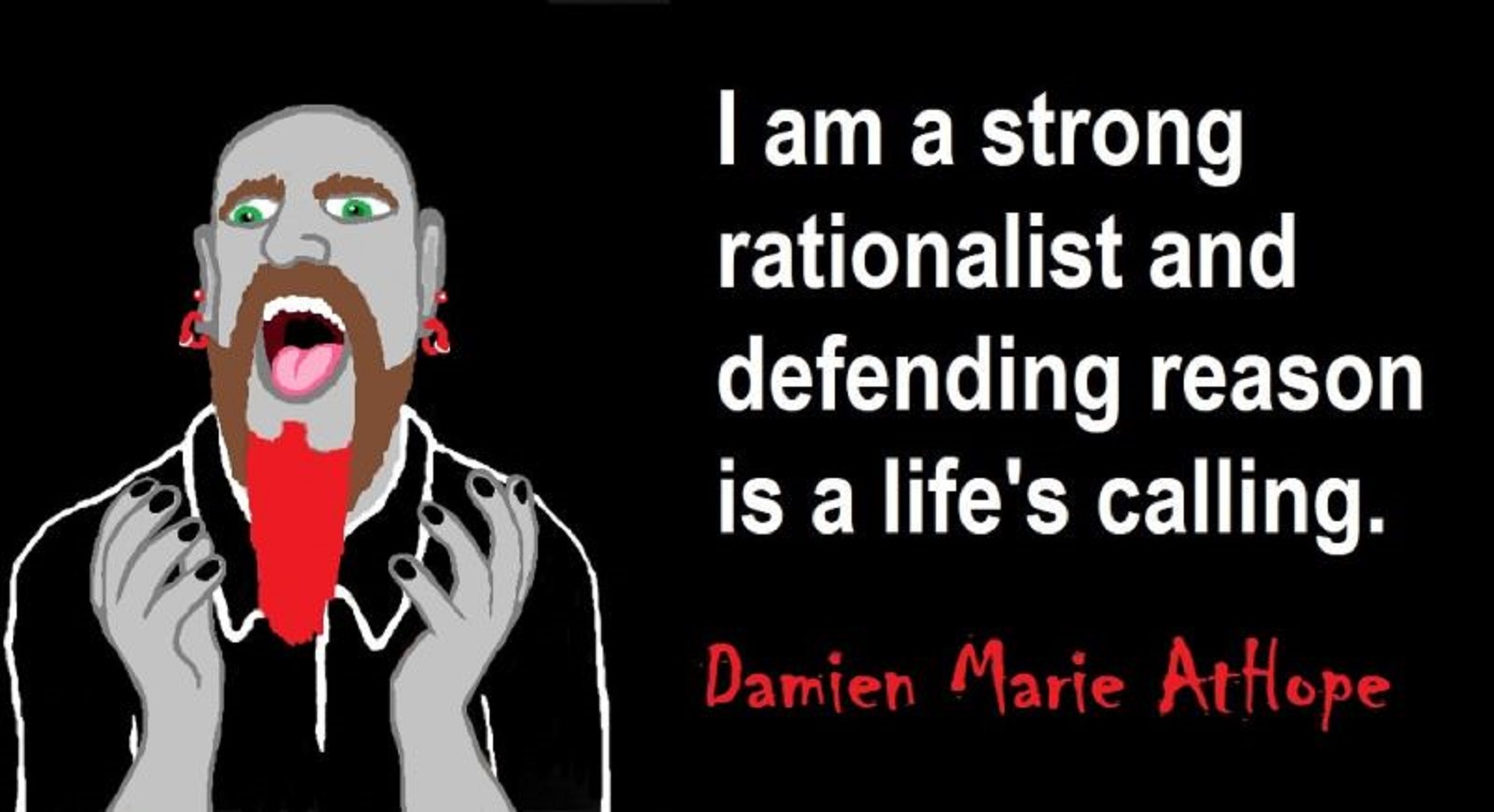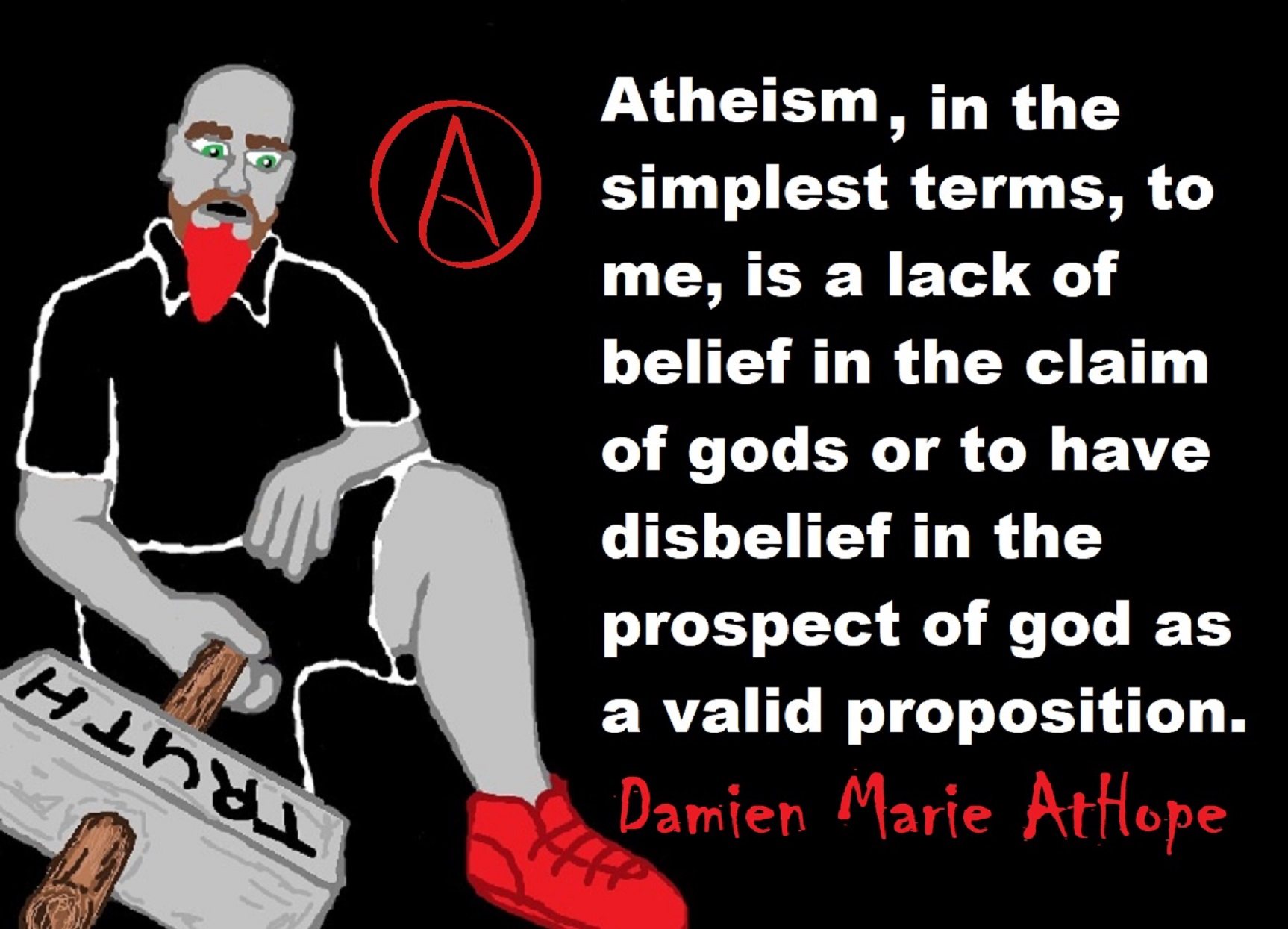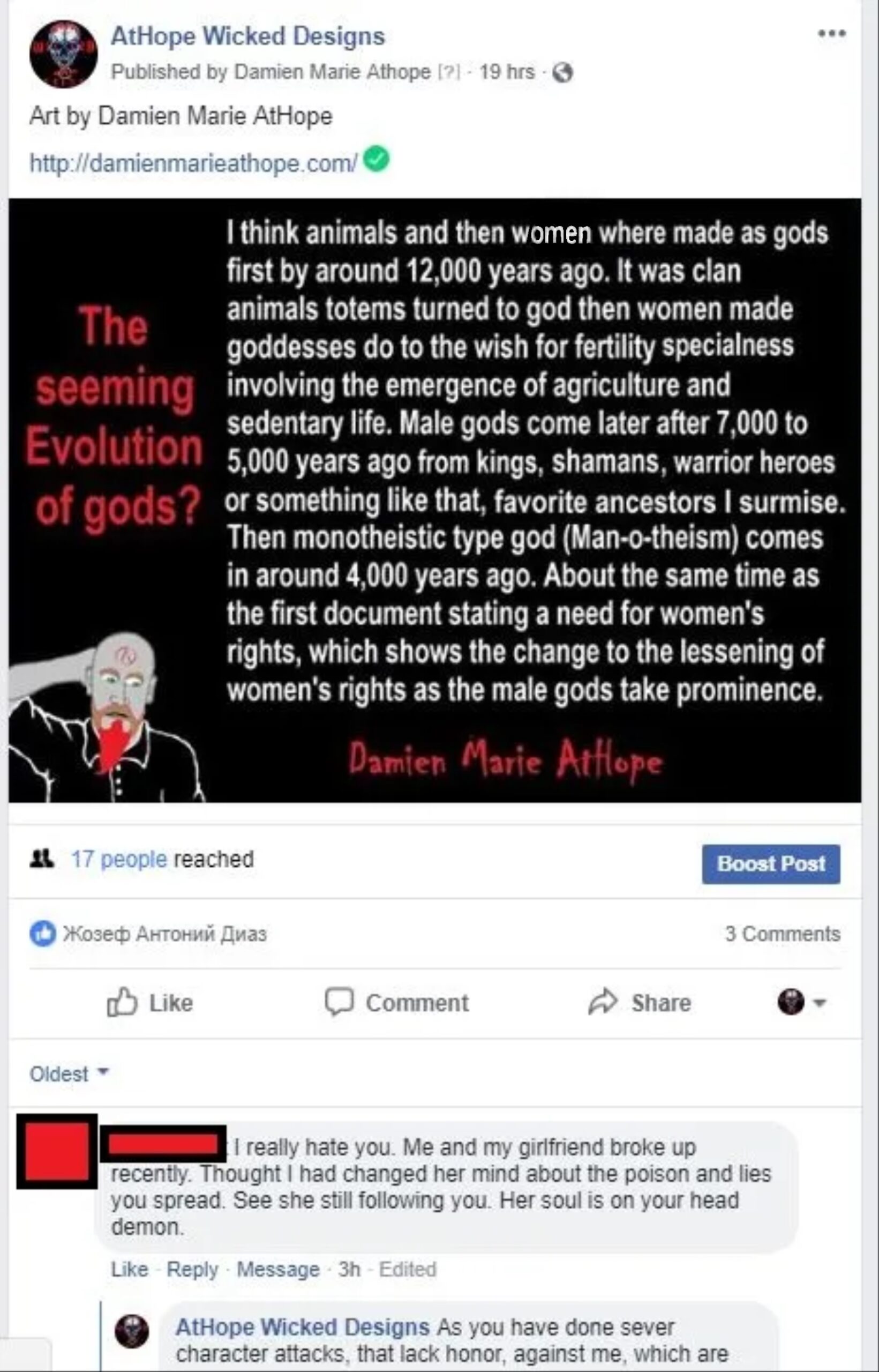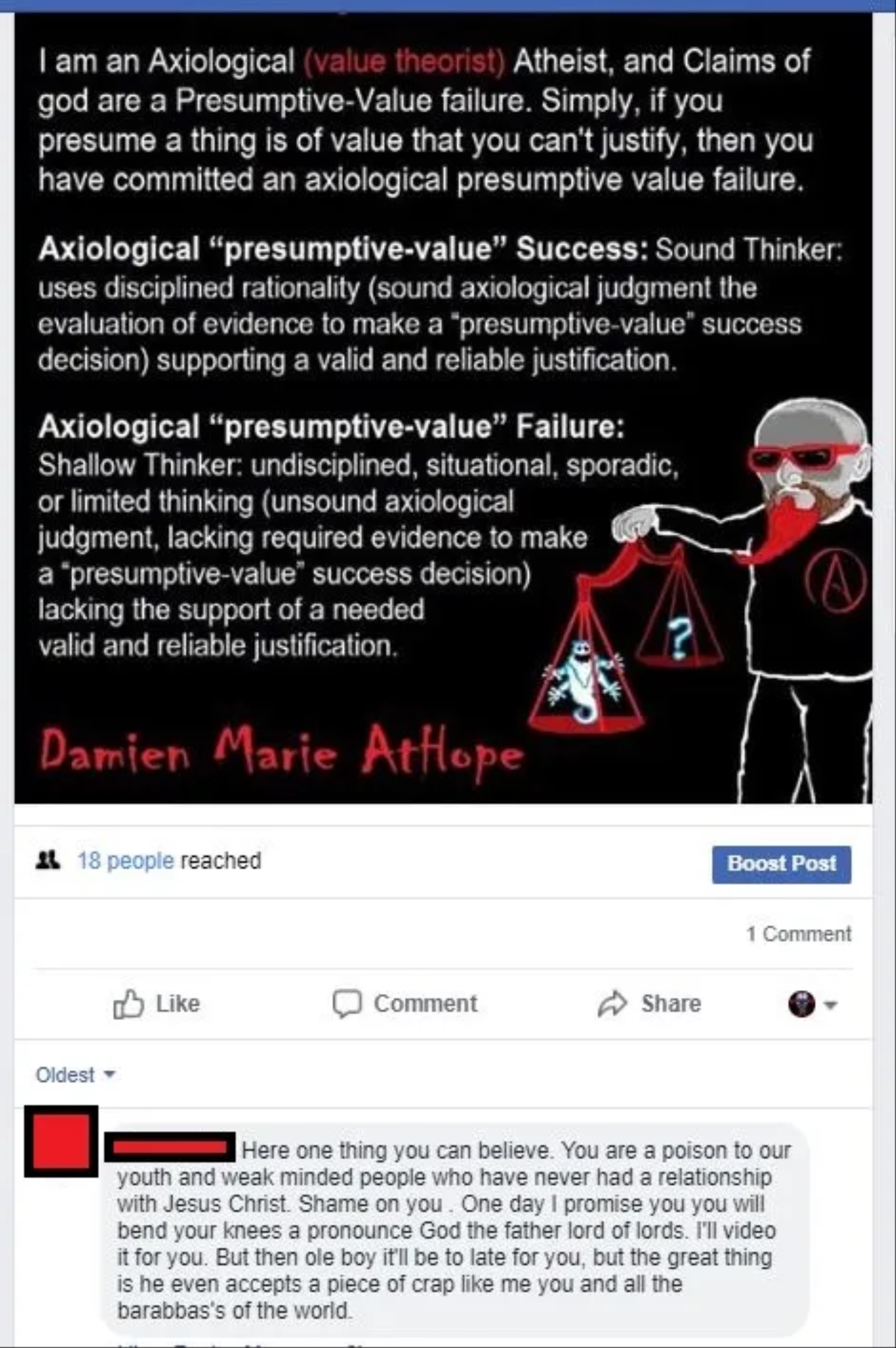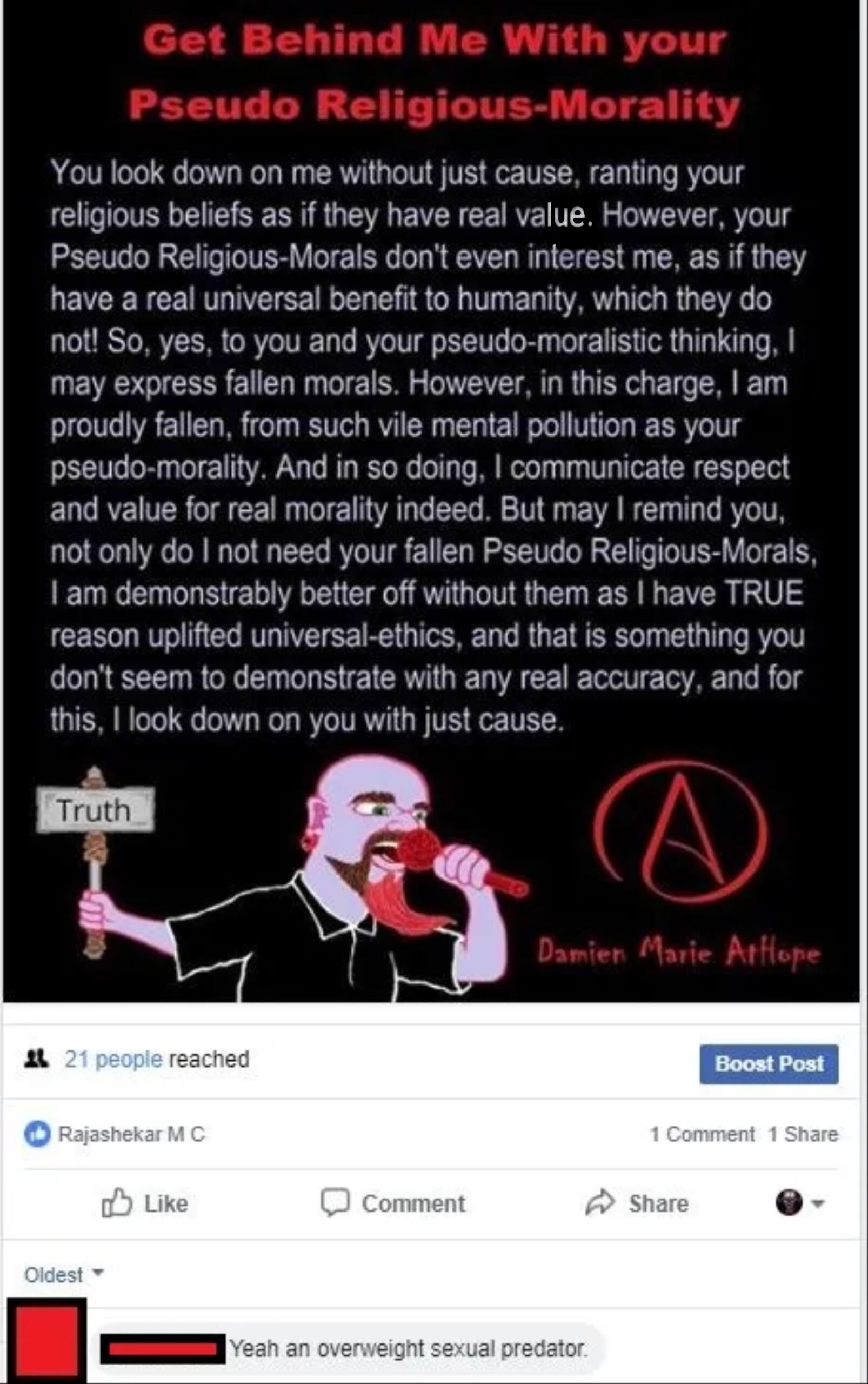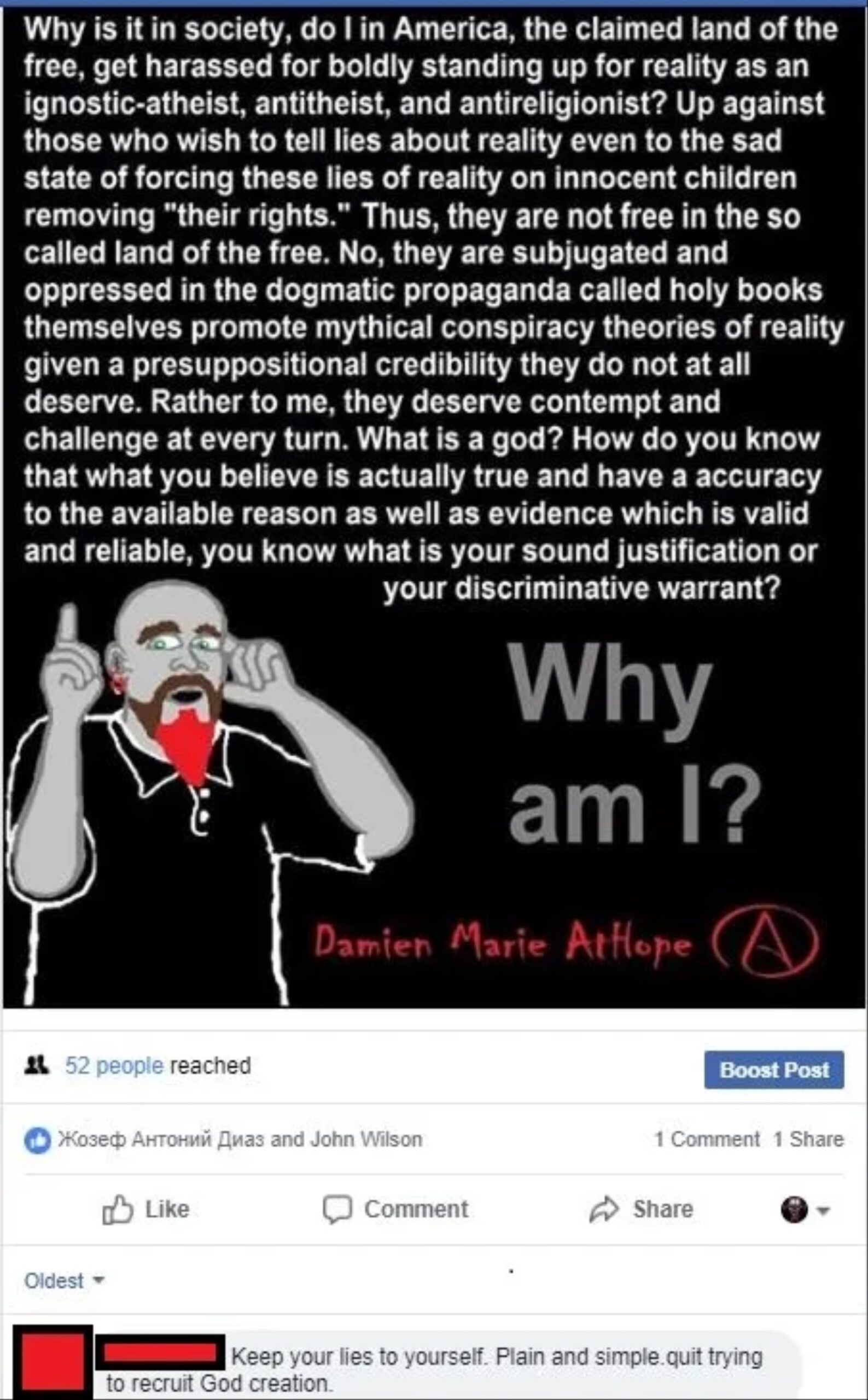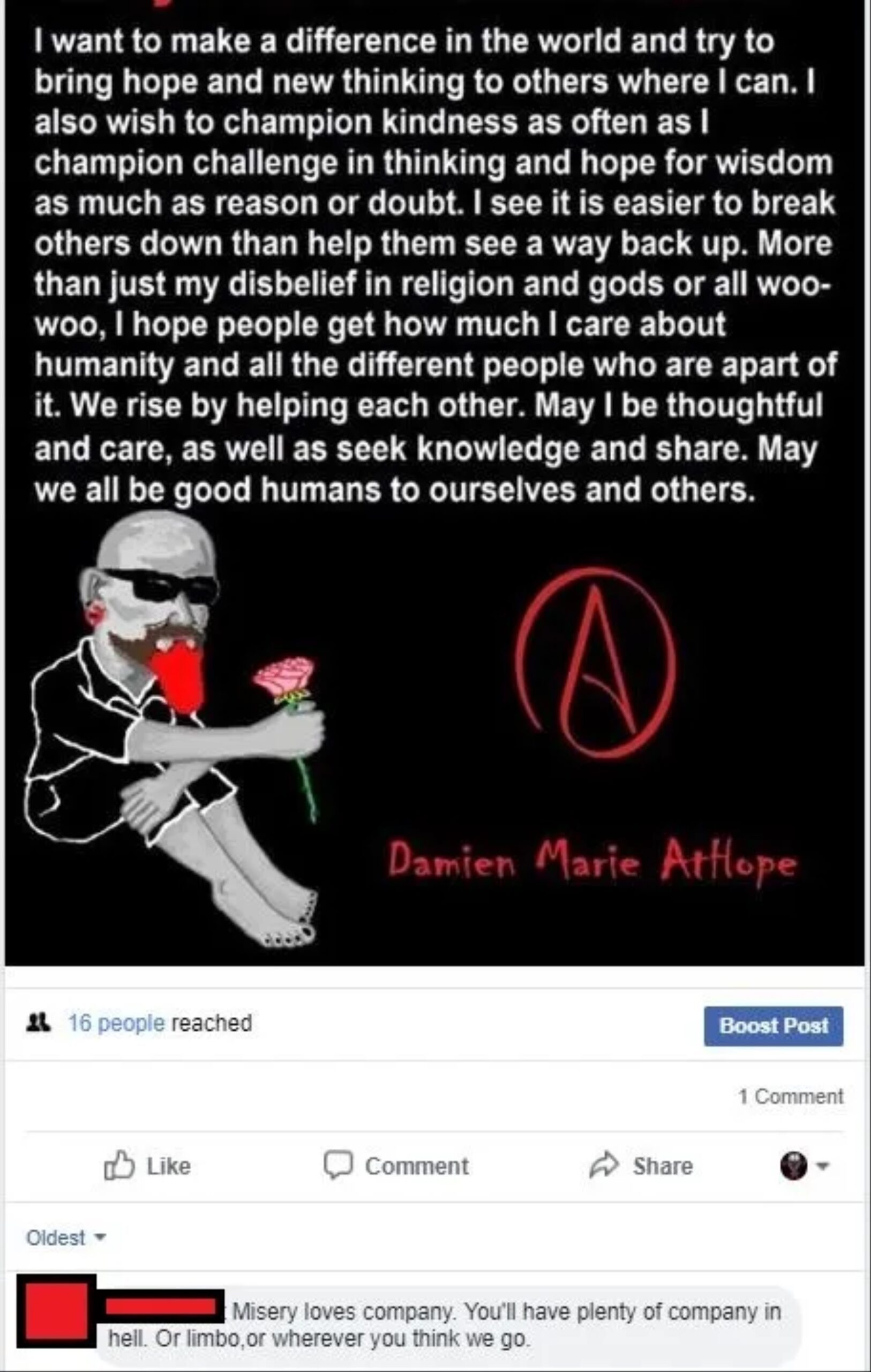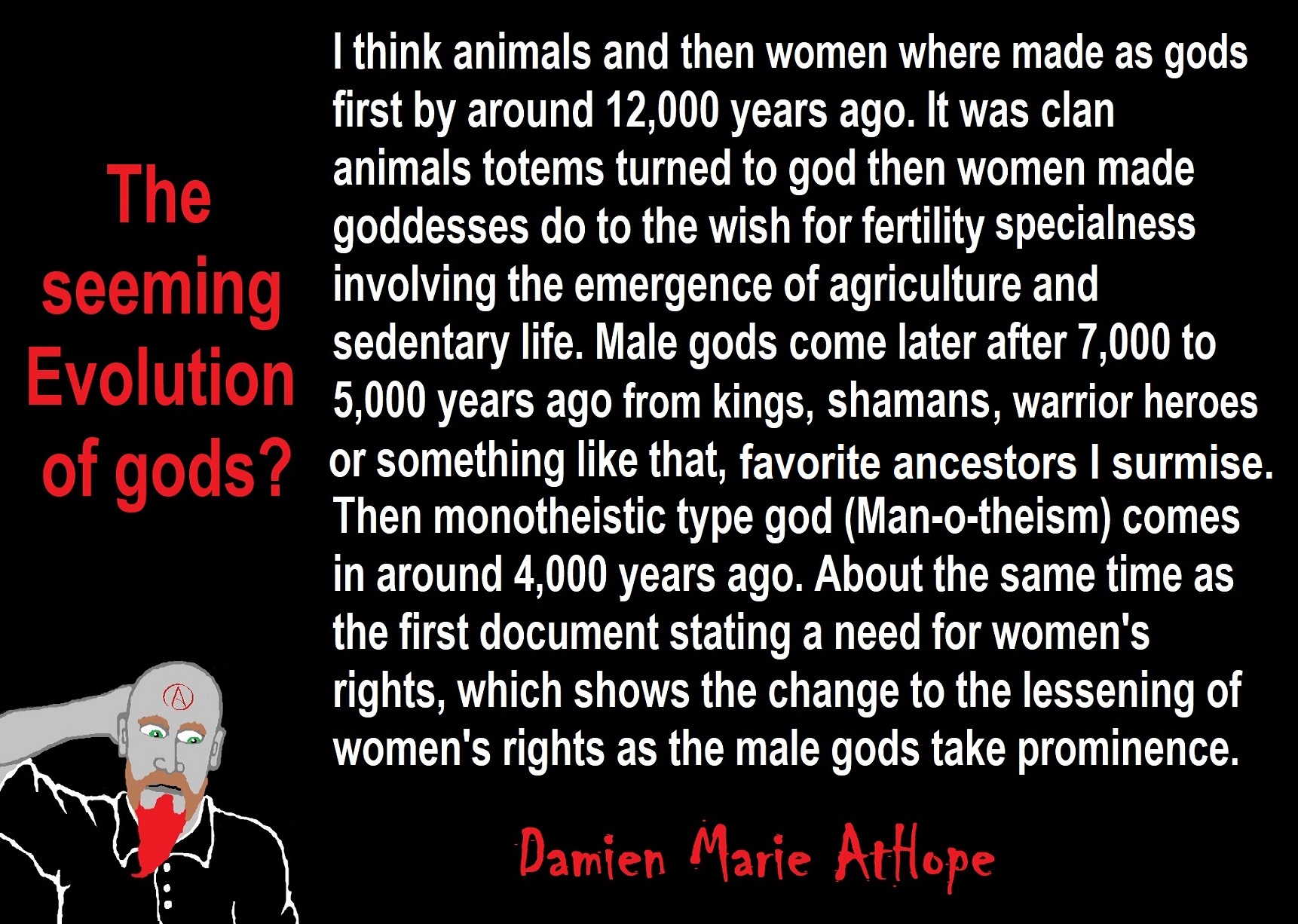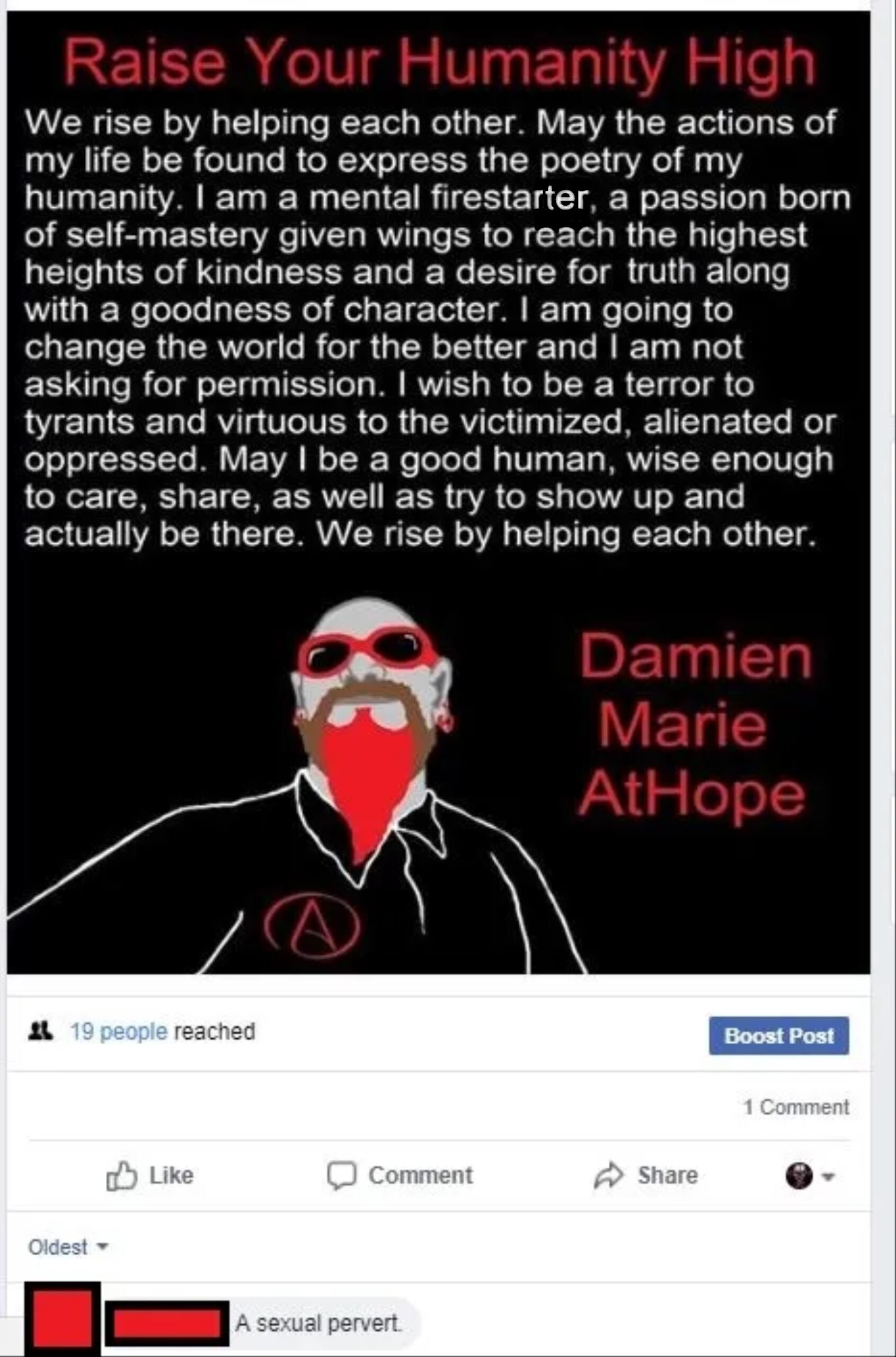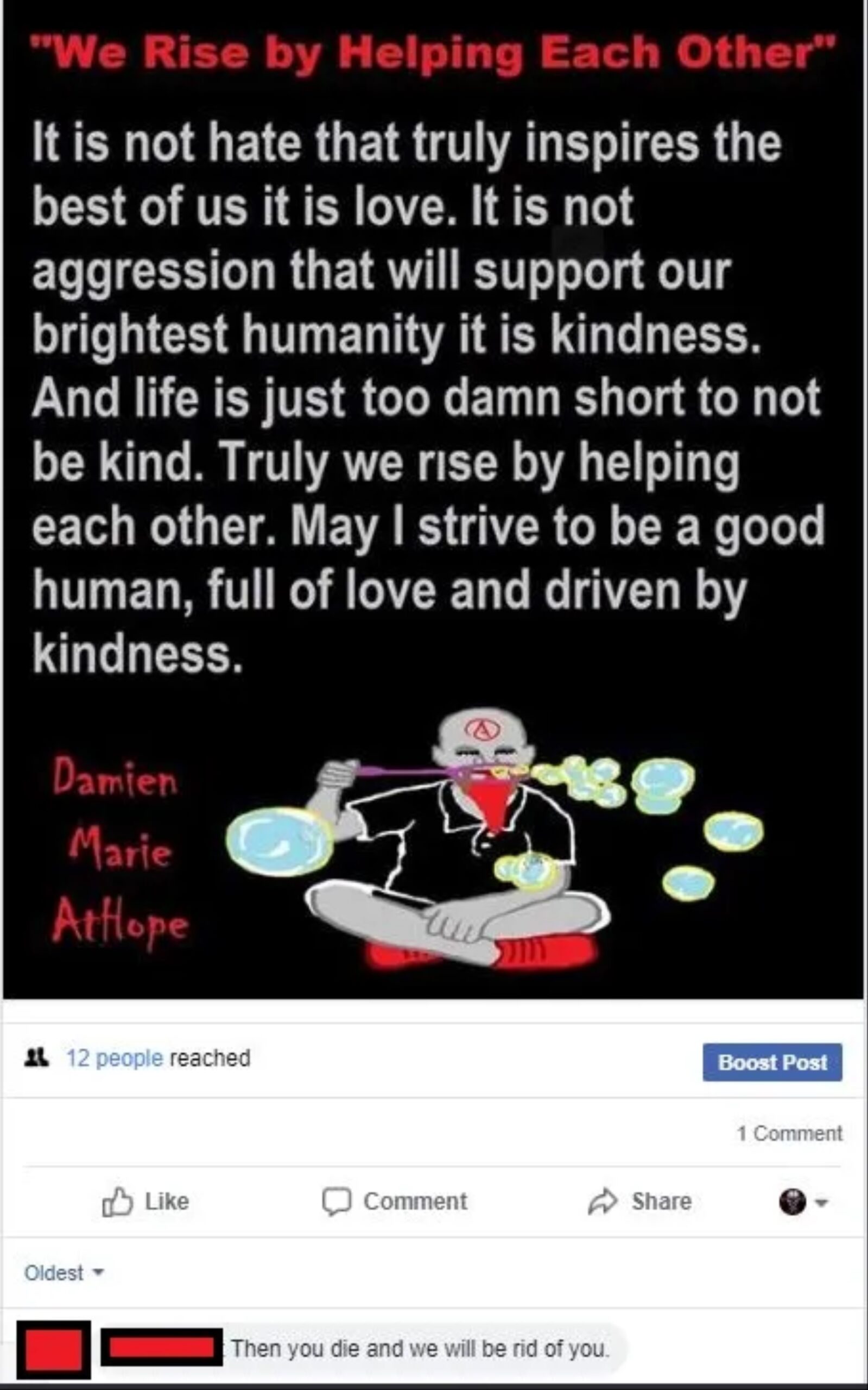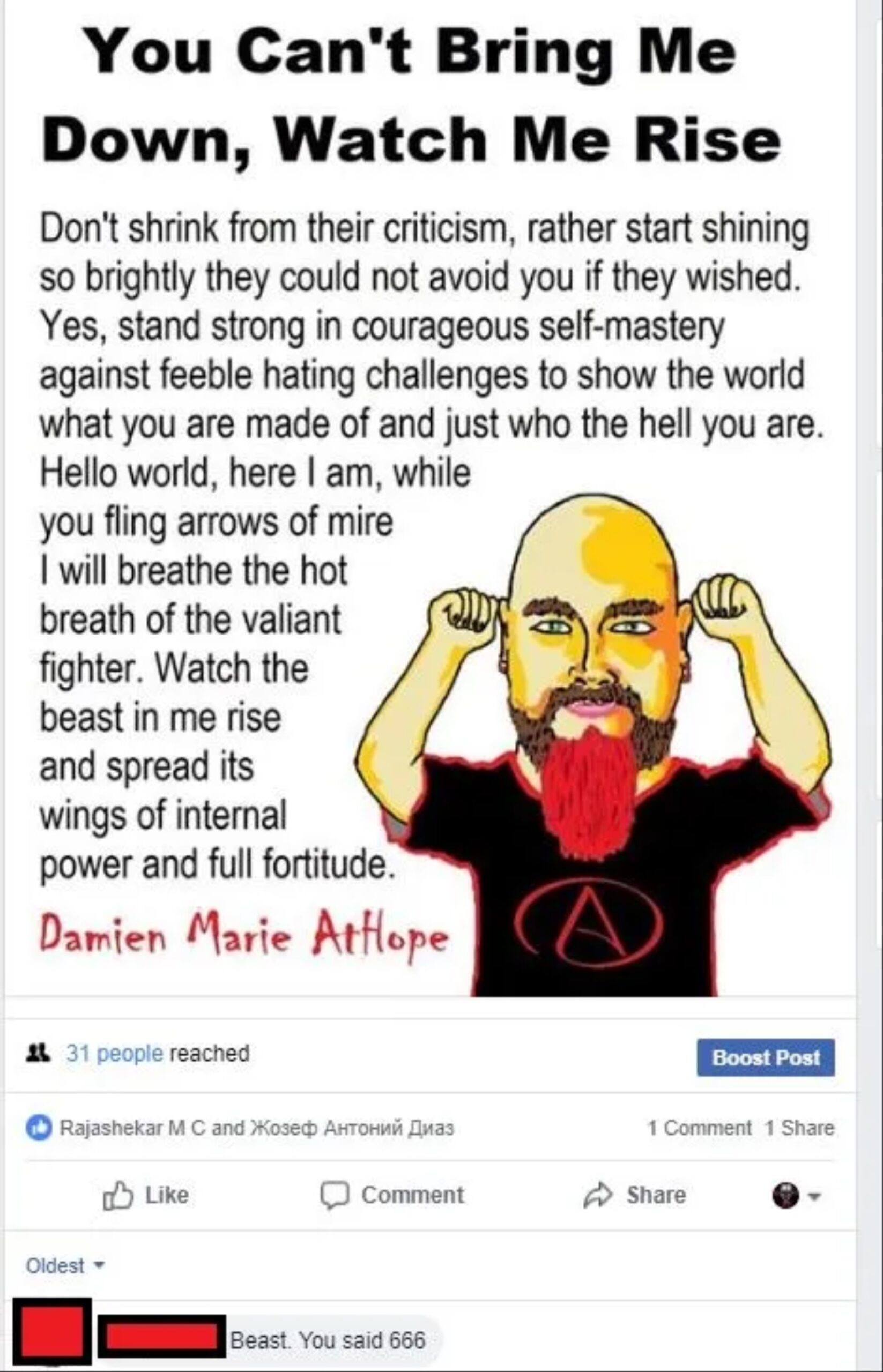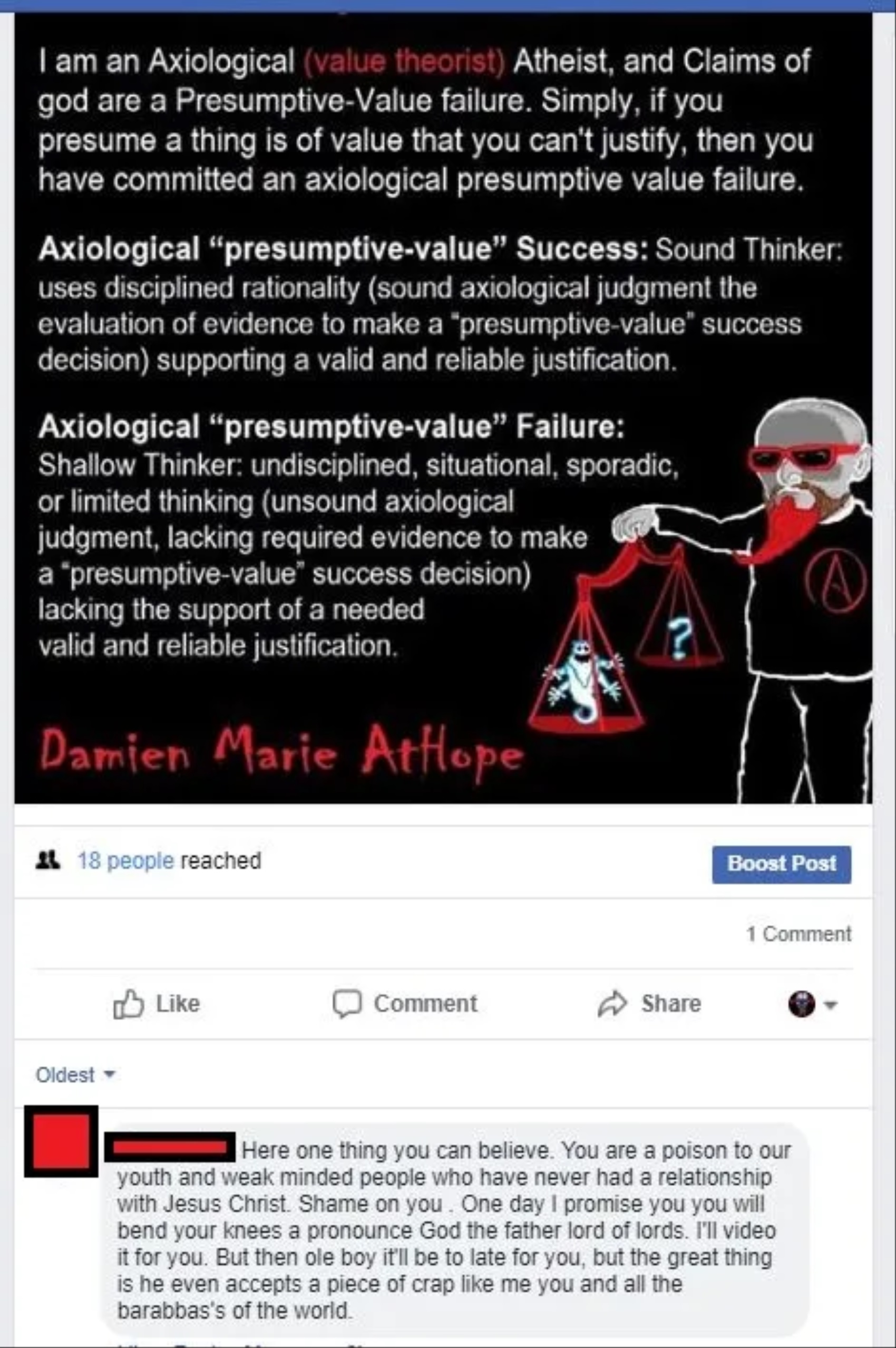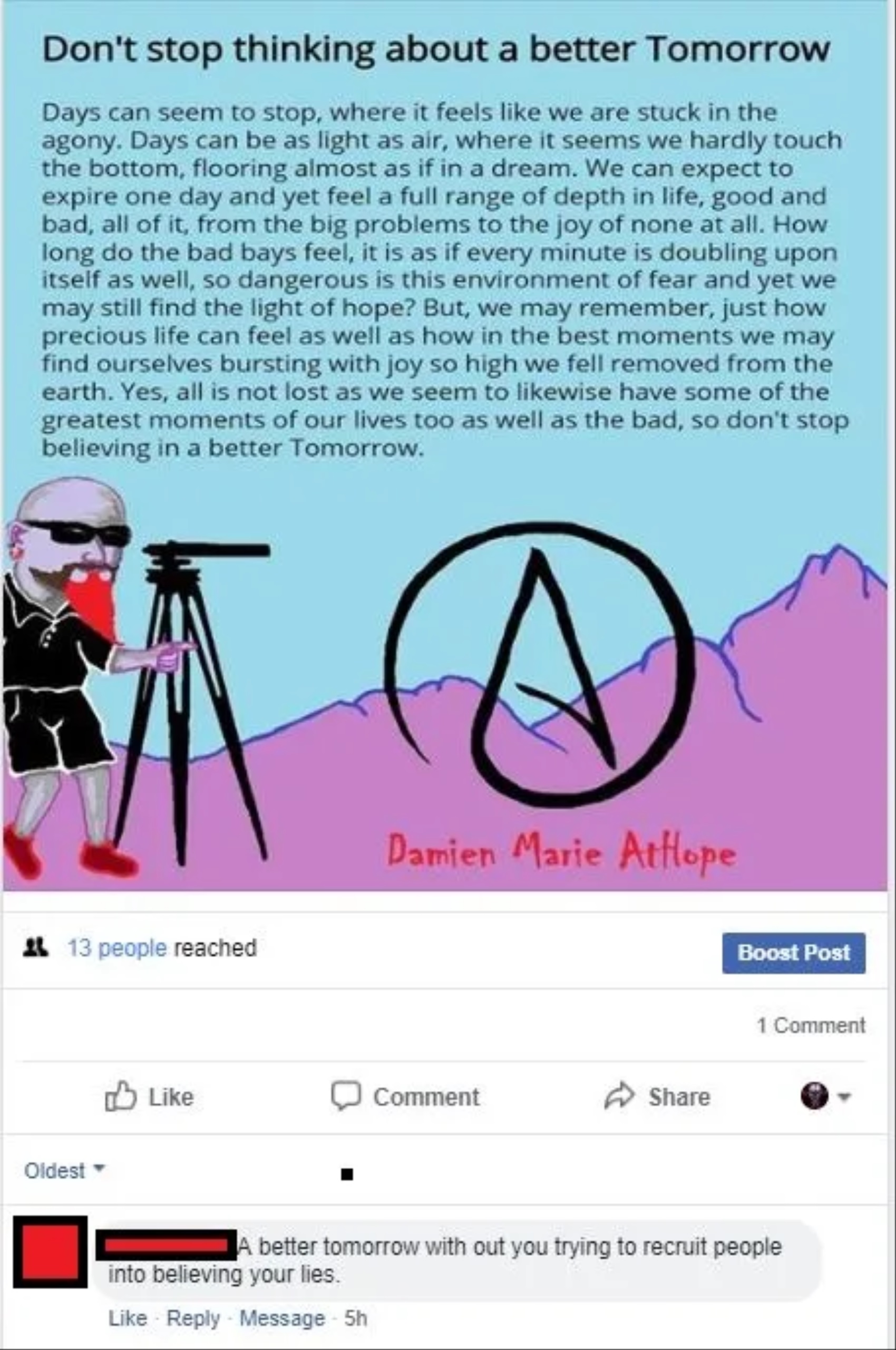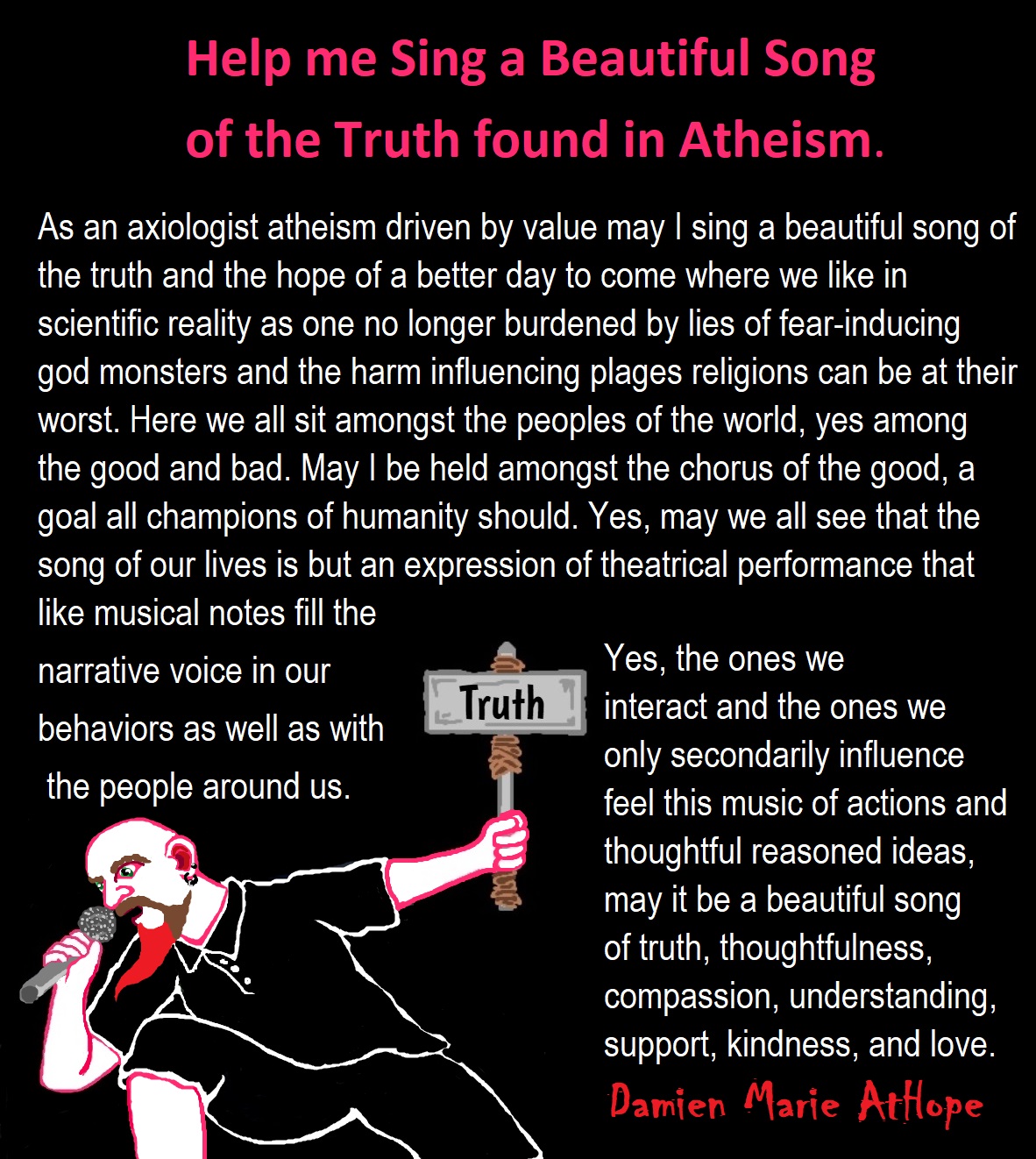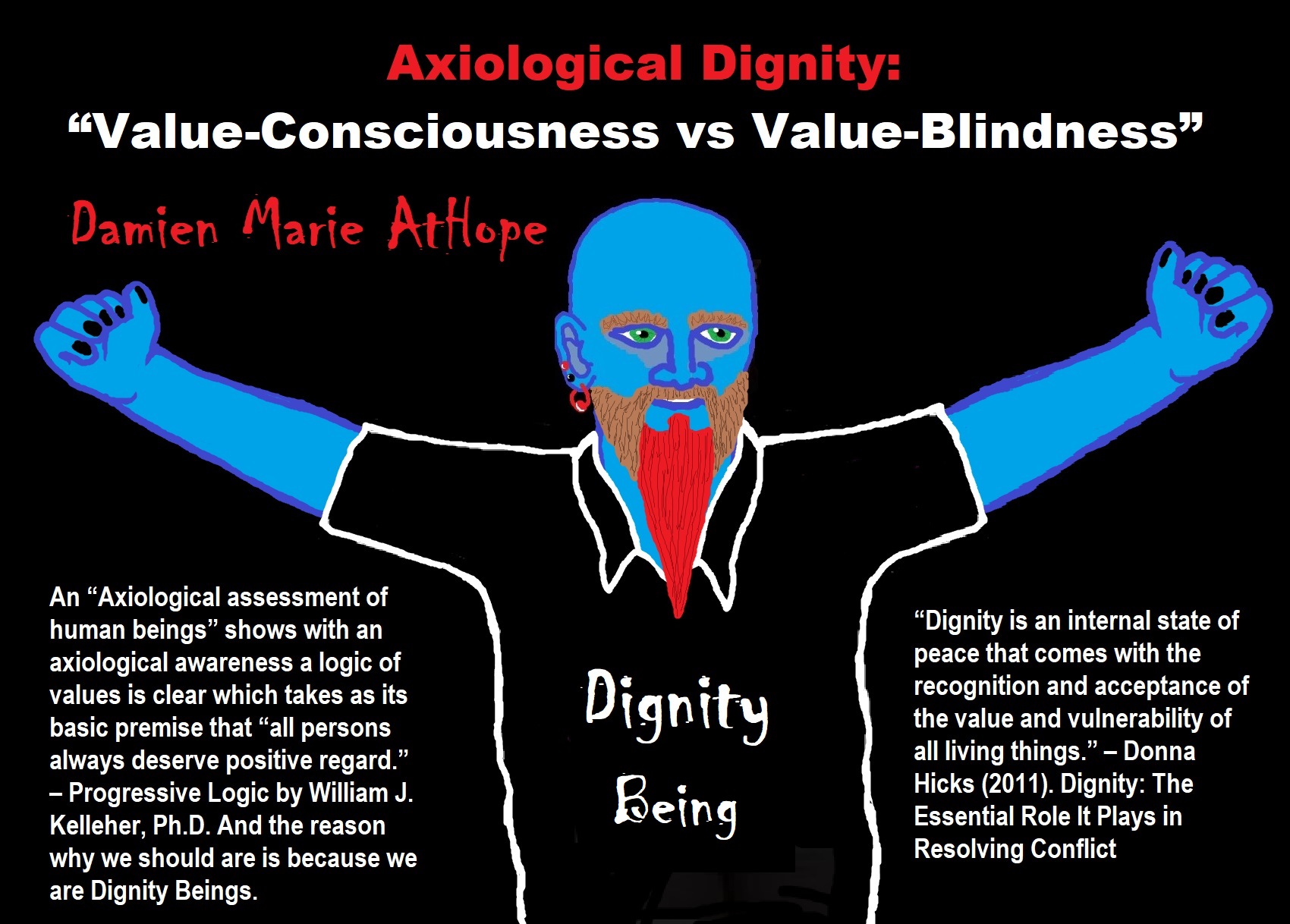
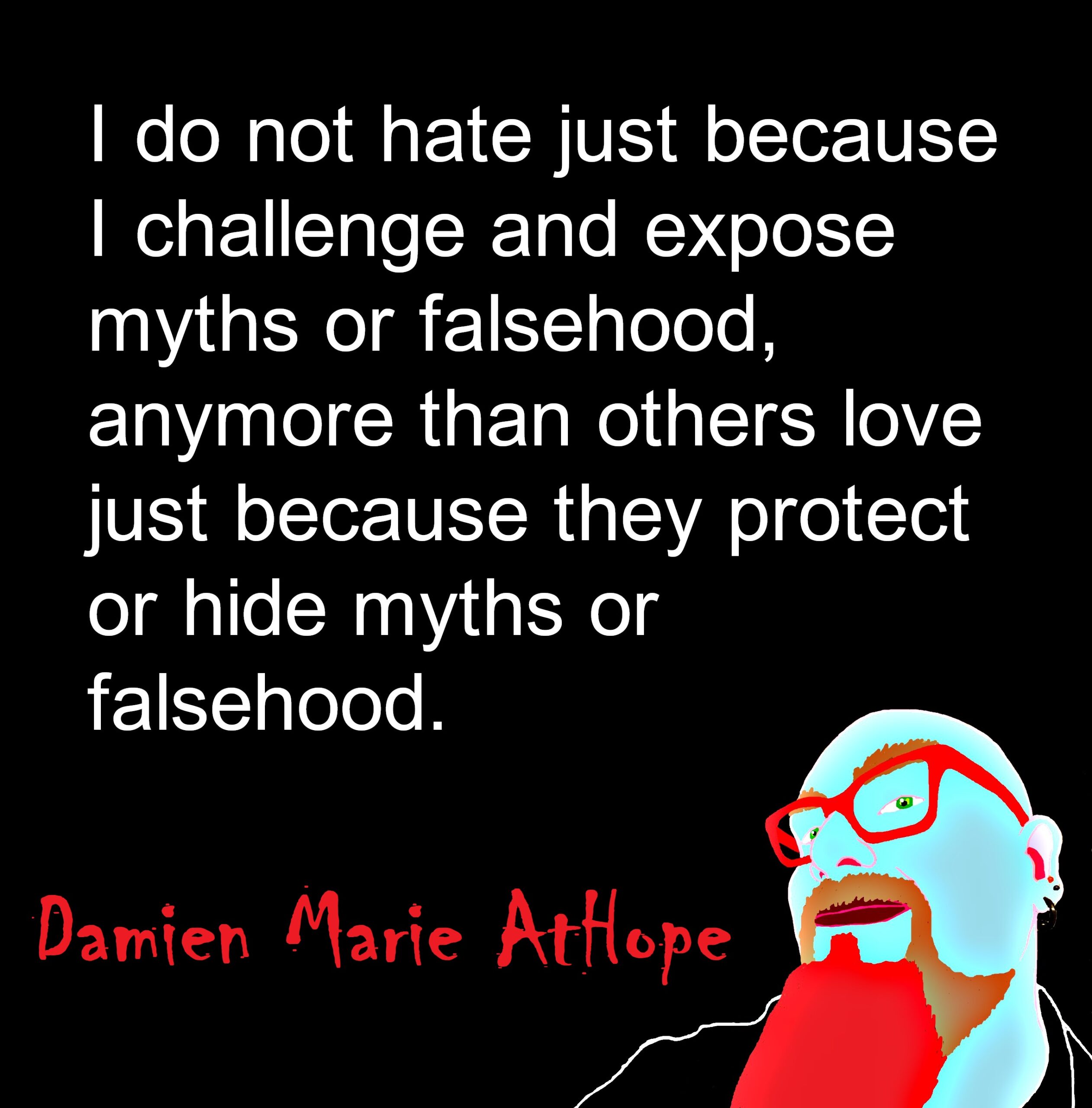
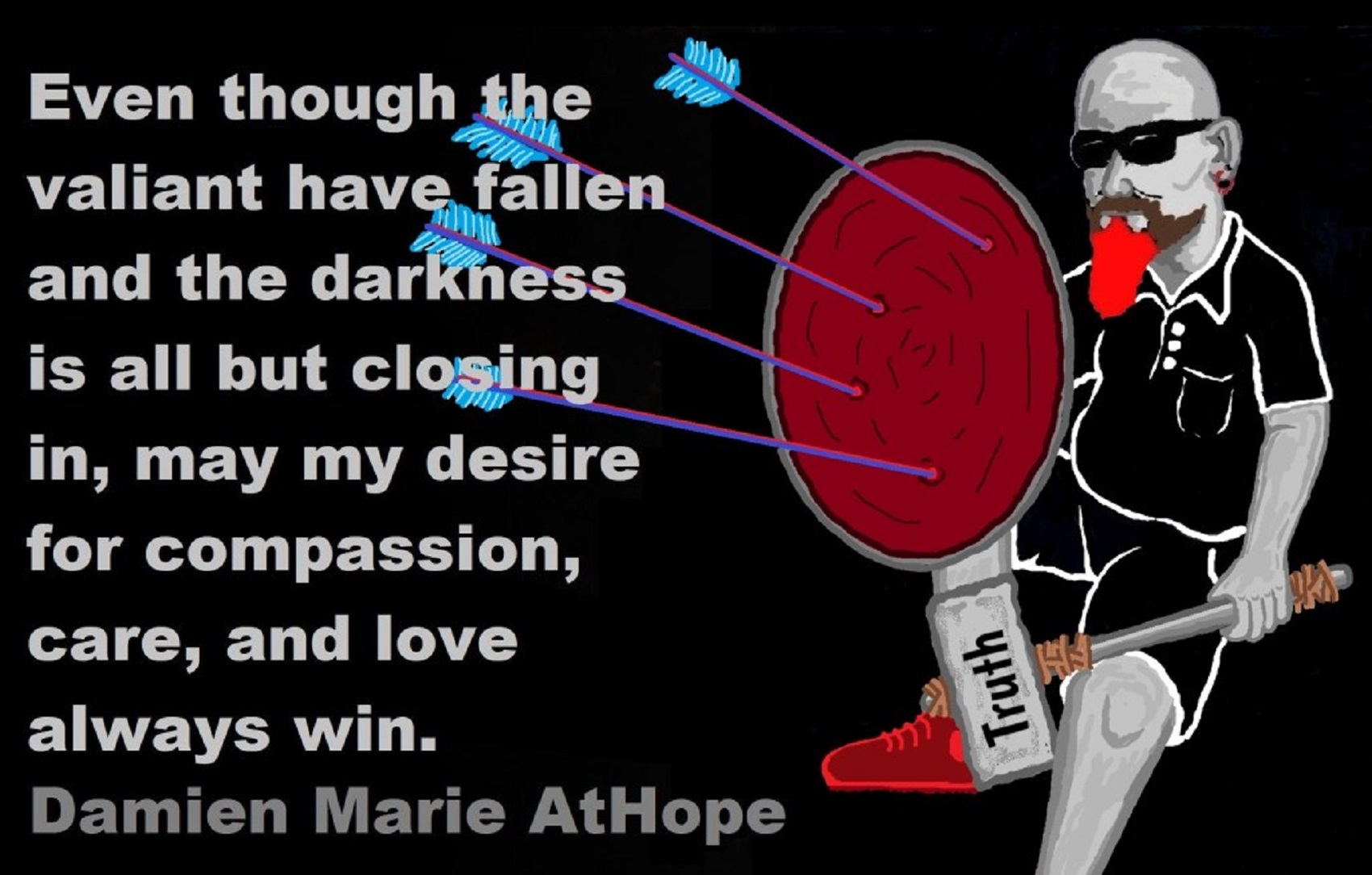
Turning a Troll?
Christain Troll, “Here one thing you can believe. You are a poison to our youth and weak minded people who have never had a relationship with Jesus Christ. Shame on you. One day I promise you, you will bend your knees a pronounce God the father lord of lords. I’ll video it for you. But then ole boy it’ll be to late for you, but the great thing is he even accepts a piece of crap like me you and all the barabbas’s of the world. You said 666. Yeah an overweight sexual predator. A sexual pervert. God gave us a brain. Plus we dont have a true Christ like faith. Or we could have an all prayer hospital, but God expects us to use our brains. Then you die and we will be rid of you. Keep your lies to yourself. Plain and simple. Quit trying to recruit God creation. Misery loves company. You’ll have plenty of company in hell. Or limbo, or wherever you think we go. I really hate you. Me and my girlfriend broke up recently. Thought I had changed her mind about the poison and lies you spread. See she still following you. Her soul is on your head demon. And dont forget sexual pervert. I hope he find jesus or burns in his non existant Hell. Lol I hate this pervert. To bad God still loves him. Barabbas. A better tomorrow with out you trying to recruit people into believing your lies. Where did the first couple come from? How where they born smart pants. Practice what you preach. Lose some weight fat ass.”
My response,
As you have done sever character attacks, that lack honor, against me, which are more than just disagreement and are instead vile and unethical antisocial behavior. It’s like “cyber-stalking” or “hate-speech”, and I am thinking of contacting facebook about it. Normally had you not acted me in this shameful way, I would generally feel sorry for you and your loss. of love but your vileness and unwarranted hate towards me. However, I mostly just feel honored to hear she is wise enough to follow me, thanks for letting me know. And you are indeed being a hateful tool. Are you being and acting in a way you would be proud to bring to you god, your church, your family, your friends? Do you feel your behavior expresses the godliness you think you have that makes you believe you are better than me? For sure we can not find in the behavior presented. Your behavior holds character errors. I would say, I am still willing o try to help you as I have high character. We are presenting our character in our behaviors which is why we should put ethics above ego. So think are trying to act as jesus acted” I see you would rather react out of feel rather than out of love, so can you not get it is you that is acting demonic, not me. If I was you I would feel moral shame for how you are presenting yourself. I aspire to higher than how you have so poorly behaved. I would be happy to do a recorded chat on how you feel and see if we can get you to a more high character in your interactions with people who think differently. My blogs on the Bible, Judaism, and Christianity
“If we are all balls of meat. Why do you care? Because you where created to care. Wake up. I will not view your blogs. I won’t open your lies. Just rest assured. I’ll see you on judgment day.”– Christain Troll
My response, Are you really so abrade of the truth that shows you must not believe in the power of your faith if just looking in my blog is such a threat? Christianity Believers: Consider This? Why not be against the promotion of woo-woo pseudo-truth, when I am very against all pseudo-science, pseudo-history, and pseudo-morality and the harm they can produce. Accurate Account on how did Christianity Began? Along with the hate, such as sexism and homophobia are too often seen or the forced indoctrination of children. Let’s talk about Christianity. And this coercive indoctrination of the world religions, with their pseudo-science, pseudo-history, and pseudo-morality mainly furthered by forced Hereditary Religion (family or cultural, religious beliefs forced on children because the parent or caregiver believes that way). This is sadly done, even before a child can be expected to successfully navigate reason; it’s almost as if religious parents believe their “woo-woo pseudo-truth” lies will not be so easily accepted if they wait on a mind that can make its own choice. Because we do see how hard it is for the ones forced into Hereditary Religion. It seems difficult for them to successfully navigate reason in relation to their woo-woo pseudo-truth, found in a religion they were indoctrinationally taught to prefer, because after being instructed on how to discern pseudo-truth as truth than just wishing that their blind servitude belief in a brand of religious pseudo-truth devoid of justified, valid or reliable reason and evidence. I care because I am a rationalist, as well as an atheist. Thus, this religious set of “woo-woo pseudo-truth” pushed on the simple-minded as truth bothers me greatly. So, here it is as simple as I can make it you first need a good thinking standard to address beliefs one may approach as a possible belief warranted to be believed. I wish to smash that lying pig of religion with the Hammer of Truth: Ontology, Epistemology, and Axiology Questions (a methodological use of philosophy). Overall, I wish to promote in my self and for others; to value a worthy belief etiquette, one that desires a sound accuracy and correspondence to the truth: Reasoned belief acquisitions, good belief maintenance, and honest belief relinquishment. May we all be authenticly truthful rationalists that put facts over faith. I have made many mistakes in my life but the most common one of all is my being resistant to change. However, now I wish to be more, to be better, as I desire my openness to change if needed, not letting uncomfortable change hold me back. May I be a rationalist, holding fast to a valued belief etiquette: demanding reasoned belief acquisitions, good belief maintenance, and honest belief relinquishment. Are All Religions That Existed Before Christianity From the Devil?
Christain Commenter – Wow! That was a confusing attack! The guy has daddy issues, on multiple planes. Even though I’m a Christian, I enjoy your page. You come across as a very open and creative guy. You’re likable. I wish you’d make some abstract art. I think you have ineffable stuff to say. I’m sure it didn’t phase you, but sometimes an attack can bring you down. Don’t let it. Hang in there!
Utilizing Dignity?
Truth Navigation: Techniques for Discussions or Debates
I do truth navigation, both inquiry questions as well as
strategic facts in a tag team of debate and motivational teaching.
Truth Navigation and the fallacy of Fideism “faith-ism”
Compare ideas not people, attack thinking and not people. In this way, we have a higher chance to promote change because it’s the thinking we can help change if we address the thinking and don’t attack them.
My eclectic set of tools for my style I call “Truth Navigation” (Techniques for Discussions or Debates) which involves:
*REMS: reason (rationalism), evidence (empiricism), and methodological “truth-seeking” skepticism (Methodic doubt) (the basic or general approach)
*The Hammer of Truth: ontology, epistemology, and axiology (methodological use of philosophy)
*Dialectical Rhetoric = truth persuasion: use of facts and reasoning (motivational teaching)
*Utilizing Dignity: strategic dignity attacks or dignity enrichments (only used if confusion happens or resistance is present)
Asking the right questions at the right time with the right info can also change minds, you can’t just use facts all on their own. Denial likes consistency, the pattern of thinking cannot vary from a fixed standard of thinking, or the risk of truth could slip in. Helping people alter skewed thinking is indeed a large task but most definitely a worthy endeavor.
Turning a Theist Attack into a Chance for Their New Learning: “an open dialog”
I strive to attack thinking and not people but I sometimes may use dignity attacks or character attacks about behavior or thinking people are doing. I only say things they can quickly fix or change. Then I will pressure them to change it. My point in doing this helps mirror the bad or errored thinking or behavior so they can change if they wish I try to never do it to hurt anyone as I see this as not a productive and potentially abusive.
However, if I only spend my time pointing fingers have I not wasted times I could have also offered helping hands. Thus, even though somethings things need to be harshly pointed out so too is there a need to be involved in the benefit of helping where we can. May my drive to help not be somehow silenced just because there is a need to fight all that is wrong. I want to thank everyone throughout my life that have treated me with compassion and kindness. From something as simple as a smile or comforting word to things that create impacts so big they were life-altering; you have written with the pen of love across my heart and have helped me be a person who strives to also show and treat others with compassion as well as kindness. I do not respect faith, I respect people. I value the sanctity of “rights” of every person to self-define their beliefs and do not attack people because of what they believe. I say, attack thinking not people. We who truly value ourselves and others can and do make a better world. May we together fill the world with this shining example of humanity.
*Axiological Dignity Being Theory*
An “Axiological assessment of human beings” shows with an axiological awareness a logic of values is clear which takes as its basic premise that “all persons always deserve positive regard.” – Progressive Logic by William J. Kelleher, Ph.D. And the reason why we should is because we are Dignity Beings.
“Dignity is an internal state of peace that comes with the recognition and acceptance of the value and vulnerability of all living things.” – Donna Hicks (2011). Dignity: The Essential Role It Plays in Resolving Conflict
— Why care? Because we are Dignity Beings. —
I am inspired by philosophy, enlightened by archaeology and grounded by science that religious claims, on the whole, along with their magical gods, are but Dogmatic-Propaganda, myths and lies. Kindness beats prayers every time, even if you think prayer works, you know kindness works. Think otherwise, do both without telling people and see which one they notice. Aspire to master the heavens but don’t forget about the ones in need still here on earth. You can be kind and never love but you cannot love and never be kind. Therefore, it is this generosity of humanity, we need the most of. So, if you can be kind, as in the end some of the best we can be to others is to exchange kindness. For too long now we have allowed the dark shadow of hate to cloud our minds, while we wait in silence as if pondering if there is a need to commiserate. For too long little has been done and we too often have been part of this dark clouded shame of hate. Simply, so many humans now but sadly one is still left asking, where is the humanity?
Why Ought We Care?
Because kindness is like chicken soup to the essence of who we are, by validating the safety needs of our dignity. When the valuing of dignity is followed, a deep respect for one’s self and others as dignity beings has become one’s path. When we can see with the eyes of love and kindness, how well we finally see and understand what a demonstrates of a mature being of dignity when we value the human rights of others, as we now see others in the world as fellow beings of dignity. We need to understand what should be honored in others as fellow dignity beings and the realization of the value involved in that. As well as strive to understand how an attack to a person’s “human rights” is an attack to the value and worth of a dignity being. Yes, I want to see “you” that previous being of dignity worthy of high value and an honored moral weight to any violation of their self-ownership. And this dignity being with self-ownership rights is here before you seeking connection. what will you do, here you are in the question ever present even if never said aloud, do you see me now or are you stuck in trying to evaluate my value and assess worth as a fellow being of dignity. A violation of one’s dignity (Which it the emotional, awareness or the emotional detection of the world) as a dignity being can be quite harmful, simply we must see how it can create some physiological disturbance in the dignity being its done to. I am a mutualistic thinker and to me we all are in this life together as fellow dignity beings. Therefore, I want my life to be of a benefit to others in the world. We are natural evolutionary derived dignity beings not supernatural magic derived soul/spirit beings. Stopping lying about who we are, as your made-up magic about reality which is forced causing a problem event (misunderstanding of axiological valuations) to the natural wonder of reality. What equals a dignity worth being, it is the being whose species has cognitive awareness and the expense of pain. To make another dignity being feel pain is to do an attack to their dignity as well as your own. What equals a dignity worth being, it is the being whose species has cognitive awareness and the expense of pain. When I was younger I felt proud when I harmed those I did not like now I find it deserving even if doing it was seen as the only choice as I now see us for who we are valuable beings of dignity. I am not as worried about how I break the box you believe I need to fit as I am worried about the possibility of your confining hopes of hindering me with your limits, these life traps you have decided about and for me are as owning character attacks to my dignity’s needs which can be generalized as acceptance, understanding, and support. As I see it now, how odd I find it to have prejudice or bigotry against other humans who are intact previous fellow beings of dignity, we too often get blinded by the external packaging that holds a being of dignity internally. What I am saying don’t judge by the outside see the worth and human value they have as a dignity being. Why is it easier to see what is wrong then what is right? Why do I struggle in speaking what my heart loves as thorough and as passionate as what I dislike or hate? When you say “an act of mercy” the thing that is being appealed to or for is the proposal of or for the human quality of dignity. May my lips be sweetened with words of encouragement and compassion. May my Heart stay warm in the arms kindness. May my life be an expression of love to the world. Dignity arises in our emotional awareness depending on cognition. Our dignity is involved when you feel connected feelings with people, animals, plants, places, things, and ideas. Our dignity is involved when we feel an emotional bond “my family”, “my pet”, “my religion”, “my sport’s team” etc. Because of the core sensitivity of our dignity, we feel that when we connect, then we are also acknowledging, understanding, and supporting a perceived sense of dignity. Even if it’s not actually a dignity being in the case of plants, places, things, and ideas; and is rightly interacting with a dignity being in people and animals. We are trying to project “dignity developing motivation” towards them somewhere near equally even though human and animals don’t have the same morality weight to them. I am anthropocentric (from Greek means “human being center”) as an Axiological Atheist. I see humans value as above all other life’s value. Some say well, we are animals so they disagree with my destination. But how do the facts play out? So, you don’t have any difference in value of life? Therefore, a bug is the same as a mouse, a mouse is the same as a dolphin, a dolphin is the same as a human, all to you have exactly the same value? You fight to protect the rights of each of them equally? And all killing of any of them is the same crime murder? I know I am an animal but you also know that we do have the term humans which no other animal is classified. And we don’t take other animals to court as only humans and not any other animals are like us. We are also genetically connected to plants and stars and that still doesn’t remove the special class humans removed from all other animals. A society where you can kill a human as easily as a mosquito would simply just not work ethically to me and it should not to any reasonable person either. If you think humans and animals are of equal value, are you obviously for stronger punishment for all animals to the level of humans? If so we need tougher laws against all animals including divorce and spousal or child support and we will jail any animal parent (deadbeat animal) who does not adequately as we have been avoiding this for too long and thankfully now that in the future the ideas about animals being equal we had to create a new animal police force and animal court system, not to mention are new animal jails as we will not accept such open child abuse and disregard for responsibilities? As we don’t want to treat animals as that would be unjust to some humans, but how does this even make sense? To me it doesn’t make sense as humans a different from all other animals even though some are similar in some ways. To further discuss my idea of *dignity developing motivation” can be seen in expressions like, I love you and I appreciate you. Or the behavior of living and appreciating. However, this is only true between higher cognitive aware beings as dignity and awareness of selfness is directly related to dignity awareness. The higher the dignity awareness the higher the moral weight of the dignity in the being’s dignity. What do you think are the best ways to cultivate dignity? Well, to me dignity is not a fixed thing and it feels honored or honoring others as well as help self-helping and other helping; like ones we love or those in need, just as our dignity is affected by the interactions with others. We can value our own dignity and we can and do grow this way, but as I see it because we are a social animals we can usually we cannot fully flourish with our dignity. Thus, dignity is emotionally needy for other dignity beings that is why I surmise at least a partially why we feel empathy and compassion or emotional bonds even with animals is a dignity awareness and response. Like when we say “my pet” cat one is acknowledging our increased personal and emotional connecting. So, when we exchange in experience with a pet animal what we have done is we raze their dignity. Our dignity flourishes with acceptance, understanding and support. Our dignity withers with rejection, misunderstanding, and opposition. Dignity: is the emotional sensitivity of our sense of self or the emotional understanding about our sense of self. When you say, they have a right to what they believe, what I hear is you think I don’t have a right to comment on it. Dignity is the emotional sensitivity of our sense of self or the emotional understanding about our sense of self. To me when we say it’s wrong to kill a human, that person is appealing to our need to value the dignity of the person.’ The person with whom may possibly be killed has a life essence with an attached value and moral weight valuations. And moral weight,’ which is different depending on the value of the dignity being you are addressing understanding moral weight as a kind of liability, responsibility, or rights is actualized. So, it’s the dignity to which we are saying validates the right to life. But I believe all living things with cognitively aware have a dignity. As to me dignity is the name I home to the emotional experience, emotional expression, emotional intelligence or sensitivity at the very core of our sense of self the more aware the hire that dignity value and thus worth. Dignity is often shredded similar to my thinking: “Moral, ethical, legal, and political discussions use the concept of dignity to express the idea that a being has an innate right to be valued, respected, and to receive ethical treatment. In the modern context dignity, can function as an extension of the Enlightenment-era concepts of inherent, inalienable rights. English-speakers often use the word “dignity” in prescriptive and cautionary ways: for example, in politics it can be used to critique the treatment of oppressed and vulnerable groups and peoples, but it has also been applied to cultures and sub-cultures, to religious beliefs and ideals, to animals used for food or research, and to plants. “Dignity” also has descriptive meanings pertaining to human worth. In general, the term has various functions and meanings depending on how the term is used and on the context.” Dignity, authenticity and integrity are of the highest value to our experience, yet ones that we must define for ourselves. People of hurt and harm, you are not as free to attack other beings of dignity without any effect on you as you may think. So, I am sorry not sorry that there is no such thing in general, as hurting or harming other beings of dignity without psychological destruction to the dignity being in us. This is an understanding that once done hunts and harm of other beings of dignity emotionally/psychologically hurts and harms your life as an acceptance needy dignity being, as we commonly experience moral discuss involuntary as on our deepest level as dignity beings. Disgust is deeply related to our sense of morality.
- Value-blindness Gives Rise to Sociopathic evil.
- On the Value of Being a Real Person
- Axiology and Value Consciousness
- Axiological Atheism Explained
- Ethical Thinking or Moral Reasoning Should be Rational AND Emotional
- Morals, Values, and Ethics
- True Morality Not the Golden Rule…
- Natural Morality?
- Axiology, Naturalism, Realism and Moral Theory Ideas
- Interview of Formal Axiological Atheist Dr. William Kelleher
- Don’t be Boxed in by Abstraction
- Why care? Because we are Dignity Beings.
Truth Navigation: “Belief-Etiquette”
Caring Firebrand Axiological Atheist, Antitheist, and Antireligionist as a Valuized Ethical Duty.
Ignostic Atheist: Do you Have a Coherent Definition of god?
Ethics not gods
Addressing The Ethics of Belief
Truth Navigation: “Belief-Etiquette”
Good Belief-Etiquette = Disciplined-Rationality (addressing The Ethics of Belief)
Addressing The Ethics of Belief and Logical Fallacies
Gods at best are unknown, thus are irrelevant, so just say NO to divine morals. And to humanity, which we do know, and its human-derived ethics, just say YES. Hammer of Truth: Yes, you too, have lots of beliefs…
Ethics Before EGO!
Some people seem to think EGO is simply a positive internal sense of self (some kind of strength).
Whereas, I mainly see it as a negative internal selfishness (a kind of weakness).
How often we wish to be understood and how little we wish to be the one with understanding. As a theist, the world was like magic and the god I believed in could do anything, so, to me, I thus had less awe and wonder. But now as an atheist with no magic in the world with only natural processes, therefore, I have more awe and wonder. The need for love and connection is indeed quite universal, so we should see the need to be as loving as we can.
What Harm does Our Pride or Ego Do?
*It often pushes people away from you than draws them to you.
*It often stops you from growing or even seeing a need to change.
*It often blocks love from coming into your life but may add more strife.
*It often kills your happiness rather than producing it.
*It makes you a less critical thinker but more criticizing and irrational than an openminded clear thinker.
To me, empathy is the flower of care or kindness expressed as the result of a heart blooming with compassion over EGO.
Be a person of honor:
*Be open minded
*Be understanding
*Be thoughtful
*Be informed
*Be honest
*Be caring
*Be helpful
*Be kind
I am a work in progress. The journey may be long but indeed worth it. And my arms are wide open for perfection. I looked out at the world and was ashamed. I realized I must do what must be done, I must be one of the few who care. May the desires of my heart include a love for humanity and a care to do what I can to help. We rise by helping each other and I am always trying to improve me, thus the world around me. May I not be a silent watcher of injustice. May my valor be found in my heart for humanity and not my ego. A mind unwilling to be wrong is a mind unwilling to learn. Don’t allow anger to become an unethical behavior. Empathy is not limiting one’s care to only themselves. Empathy: to think in another’s thinking, feel their feelings, and care about their experience.
May I be a person of kindness:
- Nice behavior
- Nice language
- Nice Voice
Dignity, in my thinking, involves/encompass a phenomenological/psychological-awareness/cognitive-realization and the emotional sensitivity of our sense of self or the emotional understanding about our sense of self.
What we need to understand as well as acknowledge is how we should honor others who are fellow dignity beings and the realization of the value involved in that. As well as strive to understand how an attack to a person’s “human rights” is an attack to the value and worth of a dignity being.
Our dignity is involved when you feel connected: feelings with people, animals, plants, places, things, and ideas. Our dignity is involved when we feel an emotional dignity bond “my god”, “my religion”, “my faith”, “my family”, “my pet”, “my sport’s team” etc. This involvement of emotional dignity bond will indeed make the challenging of peoples “god”, “religion”, or “faith” such a difficult task and requires a skilled navigation to get them to see things differently but it can be done.
Dignity arises in our emotional awareness depending on cognition.
May my lips be sweetened with words of encouragement and compassion. May my Heart stay warm in the arms of kindness. May my life be an expression of love to the world.
To me when we say it’s wrong to kill a human, that person is appealing to our need to value the dignity of the person.’ The person with whom may possibly be killed has a life essence with an attached value and moral weight variations. And moral weight,’ which is different depending on the value of the dignity being you are addressing understanding moral weight as a kind of liability, responsibility, or rights is actualized.
So, it’s the dignity to which we are saying validates the right to life. But I believe all living things with cognitively aware have a dignity. As to me, dignity is the name I home to the emotional experience, emotional expression, emotional intelligence or sensitivity at the very core of our sense of self the more aware the hire that dignity value and thus worth. I am not just different in my thinking on one subject, rather I am usually refined in all my thoughts. Rationalist is my nature, anti-authoritarian thinking is my methodology, atheism is my conclusion, Ignostic is my opinion, antitheism, as well as antireligionism, are my value judgments and anarchistic humanitarianism is my motivation. People are assholes, but then I remembered I too am people; and thus, I saw how I am responsible.
“Damien, so what do you think are the best ways to cultivate dignity?” – Questioner
My response, dignity is not a fixed thing and it feels honored or honoring others as well as help self-helping and other-helping; like ones we love or those in need, just as our dignity is affected by the interactions with others. We can value our own dignity and we can and do grow this way, but as I see it because we are social animals, we can usually we cannot fully flourish with our dignity. Thus dignity is emotionally needy for other dignity beings that is why I surmise at least a partially why we feel empathy and compassion or emotional bonds even with animals is a dignity awareness and response. Like when we say “my pet” cat one is acknowledging our increased personal and emotional connecting. So, when we exchange in experiences with say a pet animal what we have done is we raise their dignity.
To me, our dignity flourishes with acceptance, understanding, and support. Moreover, our dignity, in a sense, withers with rejection, misunderstanding, and opposition. Dignity thus in my thinking is the emotional sensitivity of our sense of self or the emotional understanding about our sense of self.
Dignity: Containing Value, and Moral Weight
“Admit it, Damien: How hard is it to challenge the mentally-challenged?” – Challenger
My response, I have just gotten better as I even better know what I will always try in my attacks Ontology, (understanding the thingness of things; like what is or can be real, like not god) epistemology, (understanding what you know or can know; as in you do have anything in this reality to know anything about this term you call god, and no way of knowing if There is anything non-naturalism beyond this universe and no way to state any about it if there where) and then end with axiology (understanding what is good or valuable as well as what is evil or unvaluable like how the stories about theist theistic gods are often racist, sexist, homophobic, transphobic intersexphobic, xenophobic, etc. Thus they are directly against humanity and thus are evil and unvaluable. Unvaluable; as in the god concept you have is evil and demonstrably harmful and thus is highly unvaluable to humanity).
Why care? Well because we are cognitively advanced emotionally aware beings with fragile psychologies desperately needing of prosocial interactions with others. To me, we bloom in kindness and wither under unkindness, and we are prone to mental anguish from a trauma that can list a lifetime. We simply need people, and they need us. And because kindness is like chicken soup to the essence of who we are, by validating the safety needs of our dignity.
As I see it now, how odd I find it to have prejudice or bigotry against other humans who are in fact previous fellow beings of dignity, we too often get blinded by the external packaging that holds a being of dignity internally.
The common concept of dignity is often similar to my thinking of Dignity:
“Moral, ethical, legal, and political discussions use the concept of dignity to express the idea that a being has an innate right to be valued, respected, and to receive ethical treatment. In the modern context, dignity can function as an extension of the Enlightenment-era concepts of inherent, inalienable rights. English-speakers often use the word “dignity” in prescriptive and cautionary ways: for example in politics it can be used to critique the treatment of oppressed and vulnerable groups and peoples, but it has also been applied to cultures and sub-cultures, to religious beliefs and ideals, to animals used for food or research, and to plants. “Dignity” also has descriptive meanings pertaining to human worth. In general, the term has various functions and meanings depending on how the term is used and on the context” ref
25 Ways To Kill The Toxic Ego That Will Ruin Your Life
By Ryan Holiday
How do we keep this toxic ego and selfishness at bay? How do we prevent ego from “sucking us down like the law of gravity?” The primary answer is simple: awareness. But after that, it’s a matter of hard work. In the course of researching Ego is the Enemy I was exposed to many strategies for combatting our arrogant and selfish impulses. Here are 25 proven exercises from successful men and women throughout history that will help you stay sober, clear-headed, creative and humble. They work if you work them.
1. Adopt the beginner’s mindset. “It is impossible to learn that which one thinks one already knows,” Epictetus says. When we let ego tell us that we have arrived and figured it all out, it prevents us from learning. Pick up a book on a subject you know next to nothing about. Walk through a library or a bookstore—remind yourself how much you don’t know.
2. Focus on the effort—not the outcome. With any creative endeavour at some point what we made leaves our hands. We can’t let what happens after that point have any sway over us. We need to remember famous coach John Wooden’s advice: “Success is peace of mind, which is a direct result of self satisfaction in knowing you made the effort to do your best to become the best that you are capable of becoming.” Doing your best is what matters. Focus on that. External rewards are just extra.
3. Choose purpose over passion. Passion runs hot and burns out, while people with purpose—think of it as passion combined with reason—are more dedicated and have control over their direction. Christopher McCandless was passionate when he went “into the wild” but it didn’t work well, right? The inventor of the Segway was passionate. Better to have clear-headed purpose.
4. Shun the comfort of talking and face the work. “Void,” Marlon Brando once said, “is terrifying to most people.” We talk endlessly on social media getting validation and attention with fake internet points avoiding the uncertainty of doing the difficult and frightening work required of any creative endeavour. As creatives we need to shut up and get to work. To face the void—despite the pain of doing so.
5. Kill your pride before you lose your head. “Whom the gods wish to destroy,” Cyril Connolly wrote, “they first call promising.” You cannot let early pride lead you astray. You must remind yourself everyday how much work is left to be done, not how much you have done. You must remember that humility is the antidote to pride.
6. Stop telling yourself a story—there is no grand narrative. When you achieve any sort of success you might think that success in the future is just the natural and expected next part of the story. This is a straightforward path to failure—by getting too cocky and overconfident. Jeff Bezos, the founder of Amazon, reminds himself that there was “no aha moment” for his billion-dollar behemoth, no matter what he might read in his own press clippings. Focus on the present moment, not the story.
7. Learn to manage (yourself and others). John DeLorean was a brilliant engineer but a poor manager (of people and himself). One executive described his management style as “chasing colored balloons”—he was constantly distracted and abandoning one project for another. It’s just not enough to be smart or right or a genius. It’s gratifying to be the micromanaging egotistical boss at the center of everything—but that’s not how organizations grow and succeed. That’s not how you can grow as a person either.
8. Know what matters to you and ruthlessly say no to everything else. Pursue what the philosopher Seneca refers to as euthymia—the tranquility of knowing what you are after and not being distracted by others. We accomplish this by having an honest conversation with ourselves and understanding our priorities. And rejecting all the rest. Learning how to say no. First, by saying no to ego which wants it all.
9. Forget credit and recognition. Before Bill Belichick became the four-time Super Bowl–winning head coach of the New England Patriots, he made his way up the ranks of the NFL by doing grunt work and making his superiors look good without getting any credit. When we are starting out in our pursuits we need to make an effort to trade short-term gratification for a long-term payoff. Submit under people who are already successful and learn and absorb everything you can. Forget credit.
10. Connect with nature and the universe at large. Going into nature is a powerful feeling and we need to tap into it as often as possible. Nothing draws us away from it more than material success. Go out there and reconnect with the world. Realize how small you are in relation to everything else. It’s what the French philosopher Pierre Hadot has referred to as the “oceanic feeling.” There is no ego standing beneath the giant redwoods or on the edge of a cliff or next to the crashing waves of the ocean.
11. Choose alive time over dead time. According to author Robert Greene, there are two types of time in our lives: dead time, when people are passive and waiting, and alive time, when people are learning and acting and utilizing every second. During failure, ego picks dead time. It fights back: I don’t want this. I want ______. I want it my way. It indulges in being angry, aggrieved, heartbroken. Don’t let it—choose alive time instead.
12. Get out of your own head. Writer Anne Lamott knows the dangers of the soundtrack we can play in our heads: “The endless stream of self-aggrandizement, the recitation of one’s specialness, of how much more open and gifted and brilliant and knowing and misunderstood and humble one is.” That’s what you could be hearing right now. Cut through that haze with courage and live with the tangible and real, no matter how uncomfortable.
13. Let go of control. The poisonous need to control everything and micromanage is usually revealed with success. Ego starts saying: it all must be done my way—even little things, even inconsequential things. The solution is straightforward. A smart man or woman must regularly remind themselves of the limits of their power and reach. It’s simple, but not easy.
14. Place the mission and purpose above you. During World War II, General George Marshall, winner of the Nobel Peace Prize for the Marshall Plan, was practically offered the command of the troops on D-Day. Yet he told President Roosevelt: “The decision is yours, Mr. President; my wishes have nothing to do with the matter.” It came to be that Eisenhower led the invasion and performed with excellence. Marshall put the mission and purpose above himself—an act of selflessness we need to remind ourselves of.
15. When you find yourself in a hole—stop digging. “Act with fortitude and honor,” Alexander Hamilton wrote to a distraught friend in serious trouble of the man’s own making. “If you cannot reasonably hope for a favorable extrication, do not plunge deeper. Have the courage to make a full stop.” Our ego screams and rattles when it is wounded. We will then do anything to get out of trouble. Stop. Don’t make things worse. Don’t dig yourself further. Make a plan.
16. Don’t be deceived by recognition, money and success—stay sober. Success, money and power can intoxicate. What is required is those moments is sobriety and a refusal to indulge. One look at Angela Merkel, one of the most powerful women on the planet is revealing. She is plain and modest—one writer said that unpretentiousness is Merkel’s main weapon—unlike most world leaders intoxicated with position. Leave self-absorption and obsessing over one’s image for the egotists.
17. Leave your entitlement at the door. Right before he destroyed his own billion-dollar company, Ty Warner, creator of Beanie Babies, overrode the objections of one of his employees and bragged, “I could put the Ty heart on manure and they’d buy it!” You can see how this manifestation of ego can lead you to success—and how it can lead to downright failure.
18. Choose love. Martin Luther King understood that hate is like an “eroding acid that eats away the best and the objective center of your life.” Hatred is when ego turns a minor insult in a massive sore and it lashes out. But pause and ask: has hatred and lashing out ever helped anyone with anything? Don’t let it eat at you—choose love. Yes, love. See how much better you feel.
19. Pursue mastery in your chosen craft. When you are pursuing a craft you realize that the better you get, the humbler you are. Because you understand there’s always something you can learn and you are inherently humbled by this fascinating craft or career you’re after. It is hard to get a big head or become egotistical when you’ve decided on that path.
20. Keep an inner scorecard. Just because you won doesn’t mean you deservedto. We need to forget other people’s validation and external markers of success. Warren Buffett has advised keeping an inner scorecard versus the external one. Your potential, the absolute best you’re capable of—that’s the metric to measure yourself against.
21. Paranoia creates things to be paranoid about. “He who indulges empty fears earns himself real fears,” wrote Seneca, who as a political adviser witnessed destructive paranoia at the highest levels. If you let ego think that everyone is out to get you you will seem weak…and then people will really try to take advantage of you. Be strong, confident and forgiving.
22. Always stay a student. Put yourself in rooms where you’re the least knowledgeable person. Observe and learn. That uncomfortable feeling, that defensiveness that you feel when your most deeply held assumptions are challenged? Do it deliberately. Let it humble you. Remember how the physicist John Wheeler put it, “As our island of knowledge grows, so does the shore of our ignorance.”
23. No one can degrade you—they degrade themselves. Ego is sensitive about slights, insults and not getting their due. This is a waste of time. After Frederick Douglass was asked to ride in a baggage car because of his race, someone rushed to apologize for this mistreatment. Frederick’s reply? “They cannot degrade Frederick Douglass. The soul that is within me no man can degrade. I am not the one that is being degraded on account of this treatment, but those who are inflicting it upon me.”
24. Stop playing the image game—focus on a higher purpose. One of the best strategists of the last century, John Boyd, would ask the promising young acolytes under him: “To be or to do? Which way will you go?” That is, will you choose to fall in love with the image of how success looks like or you focus on a higher purpose? Will you pick obsessing over your title, number of fans, size of paycheck or on real, tangible accomplishment? You know which way ego wants to go.
25. Focus on the effort—not the results. This is so important it is appearing twice. If you can accept that you control only the effort that goes in and not the results which come out, you will be mastering your ego. All work leaves our hands at some point. Ego wants to control everything—but it cannot control other people or their reactions. Focus on your end of the equation, leave them to theirs. Remember Goethe’s line: “What matters to an active man is to do the right thing; whether the right thing comes to pass should not bother him.”
I love H.O.M.E. “Honor, Open, Motivate, & Embrace”
I am not for oppression or abuse of religious believer and want a free secular society with both freedom-of-religion and freedom-from-religion. Even though I wish the end of faith and believing in myths and superstition, I wish this by means of informing the willing and not force of the unwilling. However, I will openly challenge and rebuff religious falsehoods and misunderstanding as well as rebuke and ridicule harmful or unethical religious ideology or behavior.
I once got two of the weirdest questions at my atheist-humanist outreach.
- The first was as an atheist how do you stand up for yourself without god?
- And the other as an atheist what is your opinion on spousal abuse?
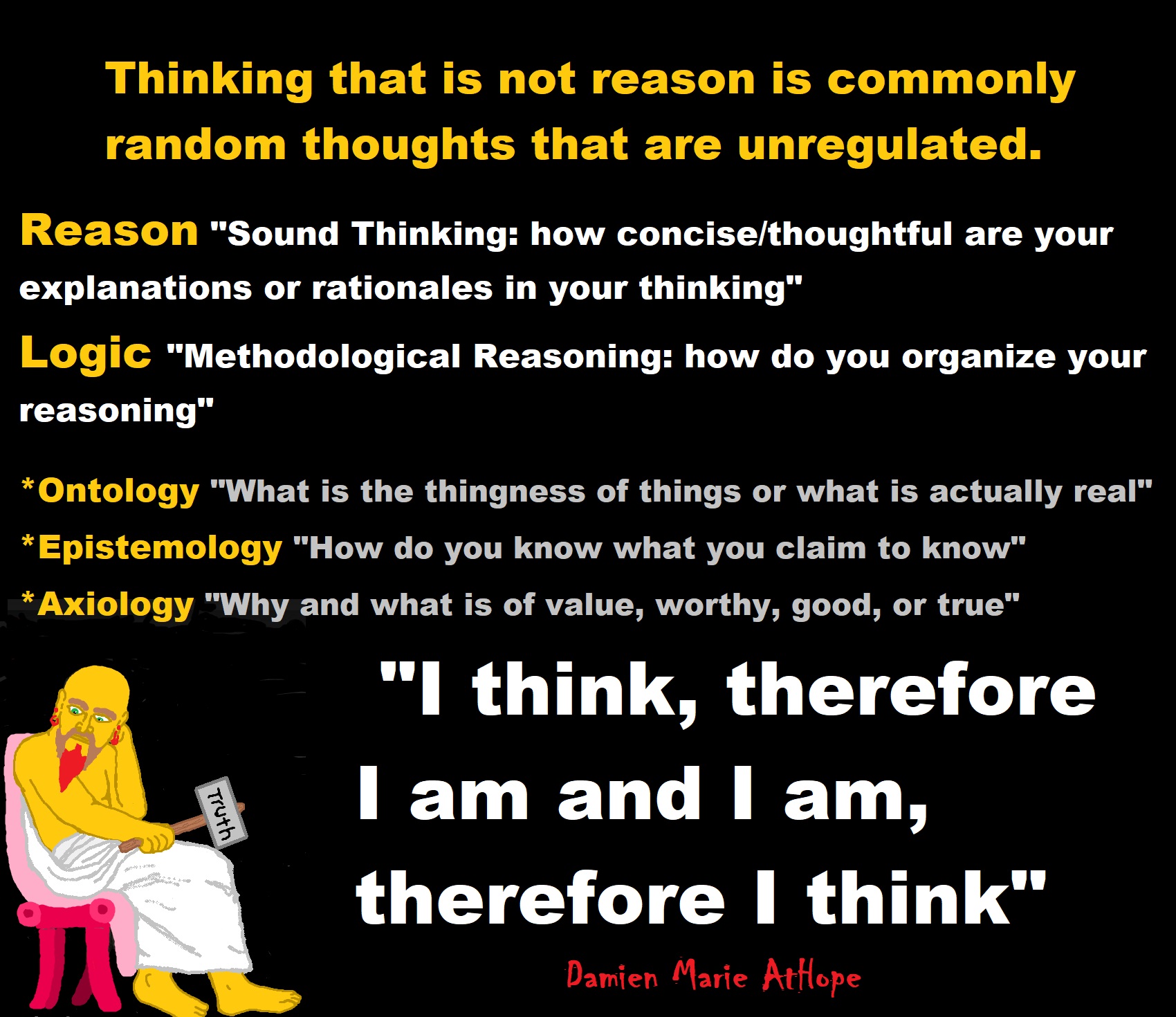
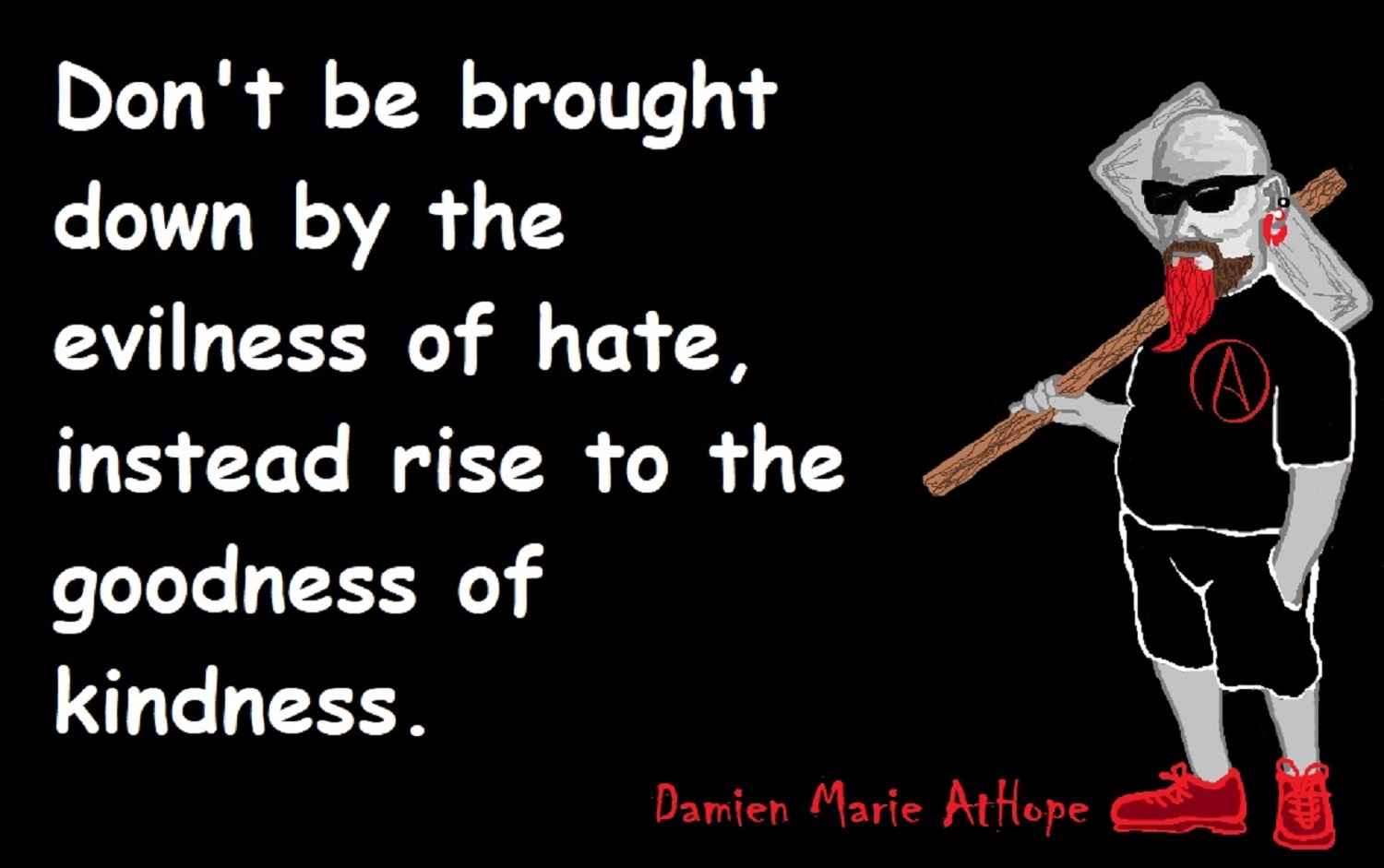
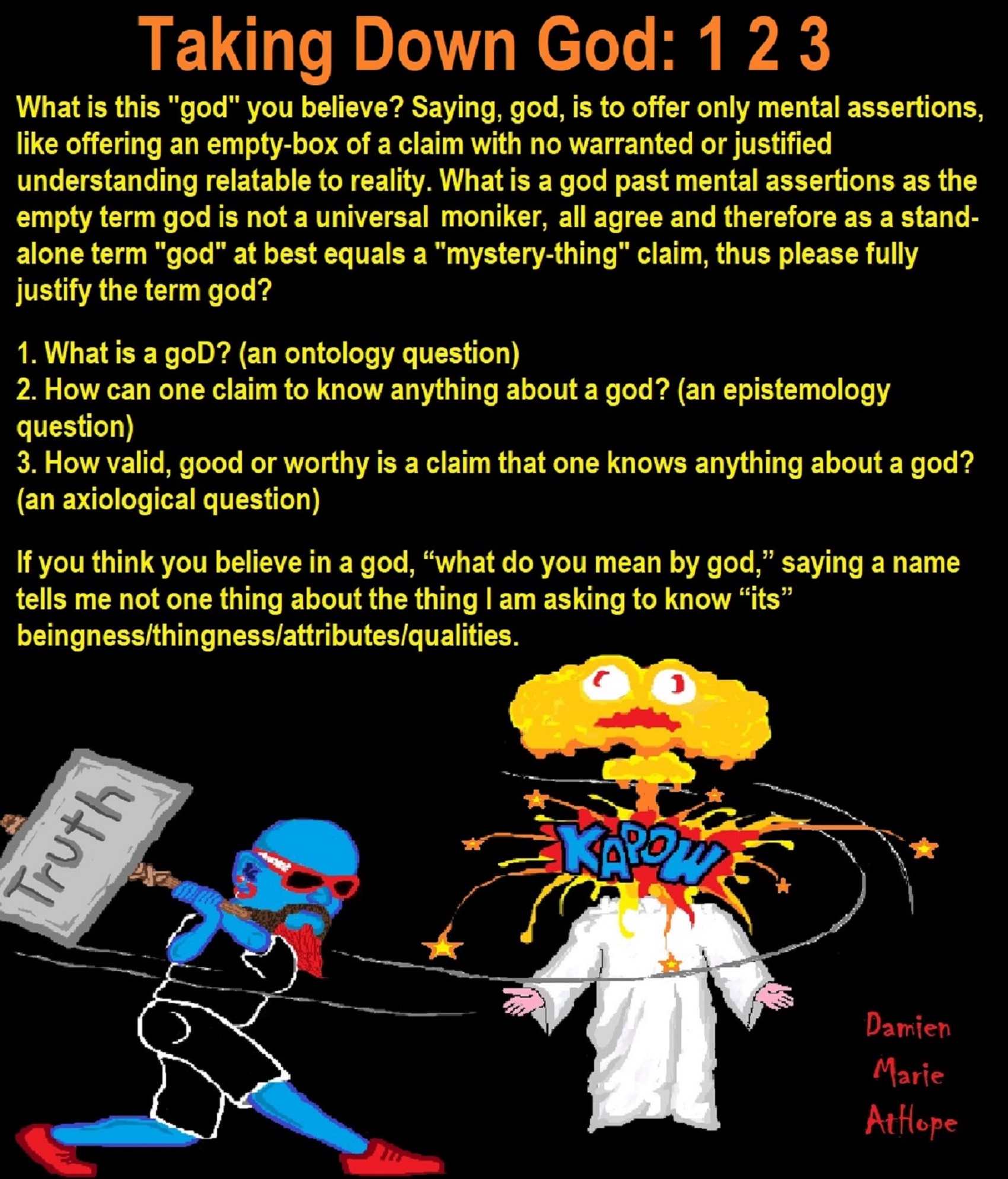
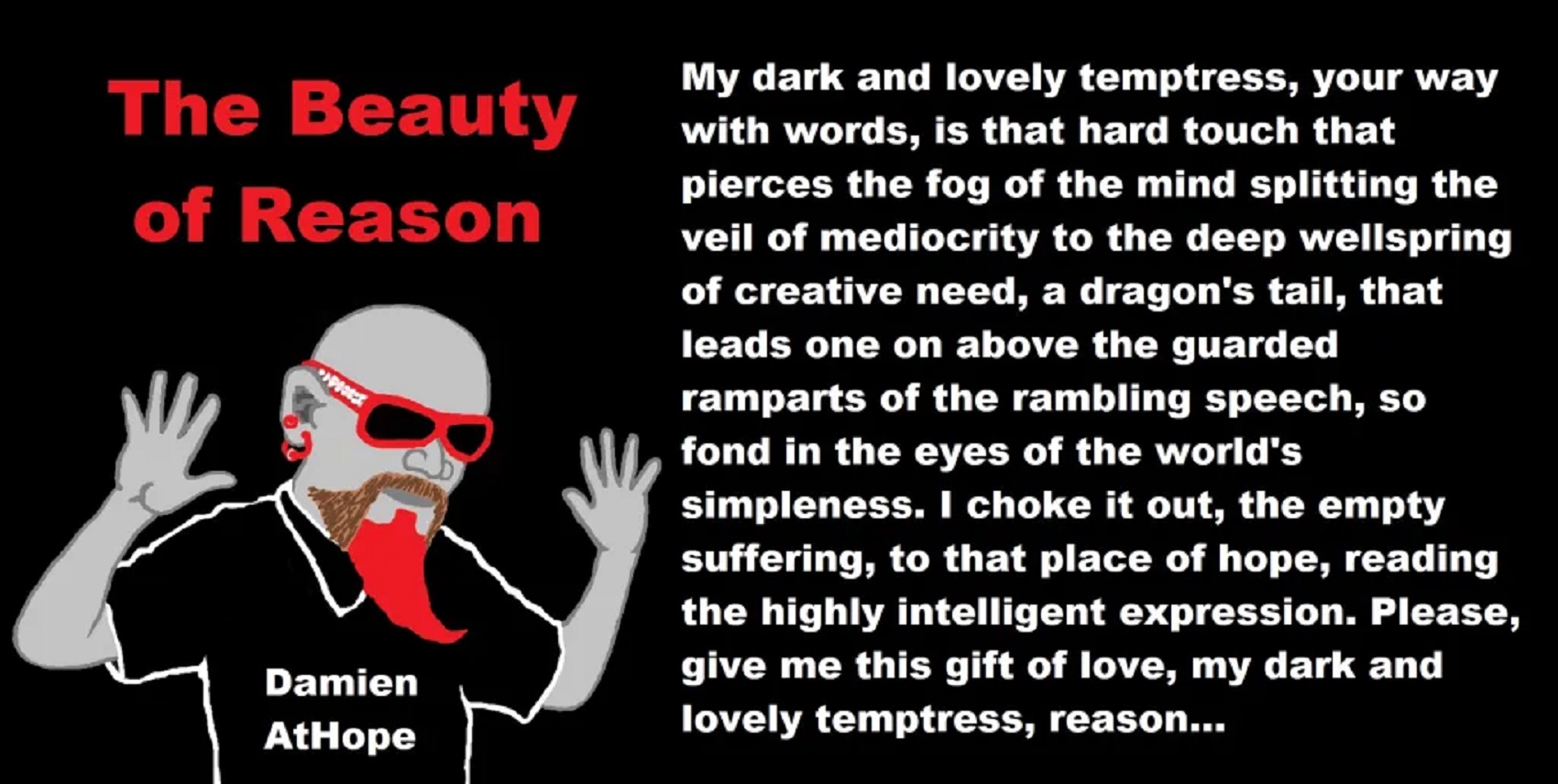

People don’t commonly teach religious history, even that of their own claimed religion. No, rather they teach a limited “pro their religion” history of their religion from a religious perspective favorable to the religion of choice.

Do you truly think “Religious Belief” is only a matter of some personal choice?
Do you not see how coercive one’s world of choice is limited to the obvious hereditary belief, in most religious choices available to the child of religious parents or caregivers? Religion is more commonly like a family, culture, society, etc. available belief that limits the belief choices of the child and that is when “Religious Belief” is not only a matter of some personal choice and when it becomes hereditary faith, not because of the quality of its alleged facts or proposed truths but because everyone else important to the child believes similarly so they do as well simply mimicking authority beliefs handed to them. Because children are raised in religion rather than being presented all possible choices but rather one limited dogmatic brand of “Religious Belief” where children only have a choice of following the belief as instructed, and then personally claim the faith hereditary belief seen in the confirming to the belief they have held themselves all their lives. This is obvious in statements asked and answered by children claiming a faith they barely understand but they do understand that their family believes “this or that” faith, so they feel obligated to believe it too. While I do agree that “Religious Belief” should only be a matter of some personal choice, it rarely is… End Hereditary Religion!

Animism: Respecting the Living World by Graham Harvey
“How have human cultures engaged with and thought about animals, plants, rocks, clouds, and other elements in their natural surroundings? Do animals and other natural objects have a spirit or soul? What is their relationship to humans? In this new study, Graham Harvey explores current and past animistic beliefs and practices of Native Americans, Maori, Aboriginal Australians, and eco-pagans. He considers the varieties of animism found in these cultures as well as their shared desire to live respectfully within larger natural communities. Drawing on his extensive casework, Harvey also considers the linguistic, performative, ecological, and activist implications of these different animisms.” ref

We are like believing machines we vacuum up ideas, like Velcro sticks to almost everything. We accumulate beliefs that we allow to negatively influence our lives, often without realizing it. Our willingness must be to alter skewed beliefs that impend our balance or reason, which allows us to achieve new positive thinking and accurate outcomes.

My thoughts on Religion Evolution with external links for more info:
- (Pre-Animism Africa mainly, but also Europe, and Asia at least 300,000 years ago), (Pre-Animism – Oxford Dictionaries)
- (Animism Africa around 100,000 years ago), (Animism – Britannica.com)
- (Totemism Europe around 50,000 years ago), (Totemism – Anthropology)
- (Shamanism Siberia around 30,000 years ago), (Shamanism – Britannica.com)
- (Paganism Turkey around 12,000 years ago), (Paganism – BBC Religion)
- (Progressed Organized Religion “Institutional Religion” Egypt around 5,000 years ago), (Ancient Egyptian Religion – Britannica.com)
- (CURRENT “World” RELIGIONS after 4,000 years ago) (Origin of Major Religions – Sacred Texts)
- (Early Atheistic Doubting at least by 2,600 years ago) (History of Atheism – Wikipedia)
“Religion is an Evolved Product” and Yes, Religion is Like Fear Given Wings…
Atheists talk about gods and religions for the same reason doctors talk about cancer, they are looking for a cure, or a firefighter talks about fires because they burn people and they care to stop them. We atheists too often feel a need to help the victims of mental slavery, held in the bondage that is the false beliefs of gods and the conspiracy theories of reality found in religions.
Understanding Religion Evolution:
- Pre-Animism (at least 300,000 years ago)
- Animism (Africa: 100,000 years ago)
- Totemism (Europe: 50,000 years ago)
- Shamanism (Siberia: 30,000 years ago)
- Paganism (Turkey: 12,000 years ago)
- Progressed organized religion (Egypt: 5,000 years ago), (Egypt, the First Dynasty 5,150 years ago)
- CURRENT “World” RELIGIONS (after 4,000 years ago)
- Early Atheistic Doubting (at least by 2,600 years ago)
“An Archaeological/Anthropological Understanding of Religion Evolution”
It seems ancient peoples had to survived amazing threats in a “dangerous universe (by superstition perceived as good and evil),” and human “immorality or imperfection of the soul” which was thought to affect the still living, leading to ancestor worship. This ancestor worship presumably led to the belief in supernatural beings, and then some of these were turned into the belief in gods. This feeble myth called gods were just a human conceived “made from nothing into something over and over, changing, again and again, taking on more as they evolve, all the while they are thought to be special,” but it is just supernatural animistic spirit-belief perceived as sacred.
Quick Evolution of Religion?
Pre-Animism (at least 300,000 years ago) pre-religion is a beginning that evolves into later Animism. So, Religion as we think of it, to me, all starts in a general way with Animism (Africa: 100,000 years ago) (theoretical belief in supernatural powers/spirits), then this is physically expressed in or with Totemism (Europe: 50,000 years ago) (theoretical belief in mythical relationship with powers/spirits through a totem item), which then enlists a full-time specific person to do this worship and believed interacting Shamanism (Siberia/Russia: 30,000 years ago) (theoretical belief in access and influence with spirits through ritual), and then there is the further employment of myths and gods added to all the above giving you Paganism (Turkey: 12,000 years ago) (often a lot more nature-based than most current top world religions, thus hinting to their close link to more ancient religious thinking it stems from). My hypothesis is expressed with an explanation of the building of a theatrical house (modern religions development). Progressed organized religion (Egypt: 5,000 years ago) with CURRENT “World” RELIGIONS (after 4,000 years ago).
Historically, in large city-state societies (such as Egypt or Iraq) starting around 5,000 years ago culminated to make religion something kind of new, a sociocultural-governmental-religious monarchy, where all or at least many of the people of such large city-state societies seem familiar with and committed to the existence of “religion” as the integrated life identity package of control dynamics with a fixed closed magical doctrine, but this juggernaut integrated religion identity package of Dogmatic-Propaganda certainly did not exist or if developed to an extent it was highly limited in most smaller prehistoric societies as they seem to lack most of the strong control dynamics with a fixed closed magical doctrine (magical beliefs could be at times be added or removed). Many people just want to see developed religious dynamics everywhere even if it is not. Instead, all that is found is largely fragments until the domestication of religion.
Religions, as we think of them today, are a new fad, even if they go back to around 6,000 years in the timeline of human existence, this amounts to almost nothing when seen in the long slow evolution of religion at least around 70,000 years ago with one of the oldest ritual worship. Stone Snake of South Africa: “first human worship” 70,000 years ago. This message of how religion and gods among them are clearly a man-made thing that was developed slowly as it was invented and then implemented peace by peace discrediting them all. Which seems to be a simple point some are just not grasping how devastating to any claims of truth when we can see the lie clearly in the archeological sites.
I wish people fought as hard for the actual values as they fight for the group/clan names political or otherwise they think support values. Every amount spent on war is theft to children in need of food or the homeless kept from shelter.
Here are several of my blog posts on history:
- To Find Truth You Must First Look
- (Magdalenian/Iberomaurusian) Connections to the First Paganists of the early Neolithic Near East Dating from around 17,000 to 12,000 Years Ago
- Natufians: an Ancient People at the Origins of Agriculture and Sedentary Life
- Possible Clan Leader/Special “MALE” Ancestor Totem Poles At Least 13,500 years ago?
- Jewish People with DNA at least 13,200 years old, Judaism, and the Origins of Some of its Ideas
- Baltic Reindeer Hunters: Swiderian, Lyngby, Ahrensburgian, and Krasnosillya cultures 12,020 to 11,020 years ago are evidence of powerful migratory waves during the last 13,000 years and a genetic link to Saami and the Finno-Ugric peoples.
- The Rise of Inequality: patriarchy and state hierarchy inequality
- Fertile Crescent 12,500 – 9,500 Years Ago: fertility and death cult belief system?
- 12,400 – 11,700 Years Ago – Kortik Tepe (Turkey) Pre/early-Agriculture Cultic Ritualism
- Ritualistic Bird Symbolism at Gobekli Tepe and its “Ancestor Cult”
- Male-Homosexual (female-like) / Trans-woman (female) Seated Figurine from Gobekli Tepe
- Could a 12,000-year-old Bull Geoglyph at Göbekli Tepe relate to older Bull and Female Art 25,000 years ago and Later Goddess and the Bull cults like Catal Huyuk?
- Sedentism and the Creation of goddesses around 12,000 years ago as well as male gods after 7,000 years ago.
- Alcohol, where Agriculture and Religion Become one? Such as Gobekli Tepe’s Ritualistic use of Grain as Food and Ritual Drink
- Neolithic Ritual Sites with T-Pillars and other Cultic Pillars
- Paganism: Goddesses around 12,000 years ago then Male Gods after 7,000 years ago
- First Patriarchy: Split of Women’s Status around 12,000 years ago & First Hierarchy: fall of Women’s Status around 5,000 years ago.
- Natufians: an Ancient People at the Origins of Agriculture and Sedentary Life
- J DNA and the Spread of Agricultural Religion (paganism)
- Paganism: an approximately 12,000-year-old belief system
- Paganism 12,000 years old: related to “Anarchism and Socialism” (Pre-Capitalism)
- Shaman burial in Israel 12,000 years ago and the Shamanism Phenomena
- Need to Mythicized: gods and goddesses
- 12,000 – 7,000 Years Ago – Paleo-Indian Culture (The Americas)
- 12,000 – 2,000 Years Ago – Indigenous-Scandinavians (Nordic)
- Norse did not wear helmets with horns?
- Pre-Pottery Neolithic Skull Cult around 11,500 to 8,400 Years Ago?
- 10,400 – 10,100 Years Ago, in Turkey the Nevail Cori Religious Settlement
- 9,000-6,500 Years Old Submerged Pre-Pottery/Pottery Neolithic Ritual Settlements off Israel’s Coast
- Catal Huyuk “first religious designed city” around 9,500 to 7,700 years ago (Turkey)
- Cultic Hunting at Catal Huyuk “first religious designed city”
- Special Items and Art as well as Special Elite Burials at Catal Huyuk
- New Rituals and Violence with the appearance of Pottery and People?
- Haplogroup N and its related Uralic Languages and Cultures
- Ainu people, Sámi people, Native Americans, the Ancient North Eurasians, and Paganistic-Shamanism with Totemism
- Ideas, Technology and People from Turkey, Europe, to China and Back again 9,000 to 5,000 years ago?
- First Pottery of Europe and the Related Cultures
- 9,000 years old Neolithic Artifacts Judean Desert and Hills Israel
- 9,000-7,000 years-old Sex and Death Rituals: Cult Sites in Israel, Jordan, and the Sinai
- 9,000-8500 year old Horned Female shaman Bad Dürrenberg Germany
- Neolithic Jewelry and the Spread of Farming in Europe Emerging out of West Turkey
- 8,600-year-old Tortoise Shells in Neolithic graves in central China have Early Writing and Shamanism
- Swing of the Mace: the rise of Elite, Forced Authority, and Inequality begin to Emerge 8,500 years ago?
- Migrations and Changing Europeans Beginning around 8,000 Years Ago
- My “Steppe-Anatolian-Kurgan hypothesis” 8,000/7,000 years ago
- Around 8,000-year-old Shared Idea of the Mistress of Animals, “Ritual” Motif
- Pre-Columbian Red-Paint (red ochre) Maritime Archaic Culture 8,000-3,000 years ago
- 7,522-6,522 years ago Linear Pottery culture which I think relates to Arcane Capitalism’s origins
- Arcane Capitalism: Primitive socialism, Primitive capital, Private ownership, Means of production, Market capitalism, Class discrimination, and Petite bourgeoisie (smaller capitalists)
- 7,500-4,750 years old Ritualistic Cucuteni-Trypillian culture of Moldova, Romania, and Ukraine
- Roots of a changing early society 7,200-6,700 years ago Jordan and Israel
- Agriculture religion (Paganism) with farming reached Britain between about 7,000 to 6,500 or so years ago and seemingly expressed in things like Western Europe’s Long Barrows
- My Thoughts on Possible Migrations of “R” DNA and Proto-Indo-European?
- “Millet” Spreading from China 7,022 years ago to Europe and related Language may have Spread with it leading to Proto-Indo-European
- Proto-Indo-European (PIE), ancestor of Indo-European languages: DNA, Society, Language, and Mythology
- The Dnieper–Donets culture and Asian varieties of Millet from China to the Black Sea region of Europe by 7,022 years ago
- Kurgan 6,000 years ago/dolmens 7,000 years ago: funeral, ritual, and other?
- 7,020 to 6,020-year-old Proto-Indo-European Homeland of Urheimat or proposed home of their Language and Religion
- Ancient Megaliths: Kurgan, Ziggurat, Pyramid, Menhir, Trilithon, Dolman, Kromlech, and Kromlech of Trilithons
- The Mytheme of Ancient North Eurasian Sacred-Dog belief and similar motifs are found in Indo-European, Native American, and Siberian comparative mythology
- Elite Power Accumulation: Ancient Trade, Tokens, Writing, Wealth, Merchants, and Priest-Kings
- Sacred Mounds, Mountains, Kurgans, and Pyramids may hold deep connections?
- Between 7,000-5,000 Years ago, rise of unequal hierarchy elite, leading to a “birth of the State” or worship of power, strong new sexism, oppression of non-elites, and the fall of Women’s equal status
- Paganism 7,000-5,000 years old: related to “Anarchism and Socialism” (Capitalism) (World War 0) Elite & their slaves
- Hell and Underworld mythologies starting maybe as far back as 7,000 to 5,000 years ago with the Proto-Indo-Europeans?
- The First Expression of the Male God around 7,000 years ago?
- White (light complexion skin) Bigotry and Sexism started 7,000 years ago?
- Around 7,000-year-old Shared Idea of the Divine Bird (Tutelary and/or Trickster spirit/deity), “Ritual” Motif
- Nekhbet an Ancient Egyptian Vulture Goddess and Tutelary Deity
- 6,720 to 4,920 years old Ritualistic Hongshan Culture of Inner Mongolia with 5,000-year-old Pyramid Mounds and Temples
- First proto-king in the Balkans, Varna culture around 6,500 years ago?
- 6,500–5,800 years ago in Israel Late Chalcolithic (Copper Age) Period in the Southern Levant Seems to Express Northern Levant Migrations, Cultural and Religious Transfer
- KING OF BEASTS: Master of Animals “Ritual” Motif, around 6,000 years old or older…
- Around 6000-year-old Shared Idea of the Solid Wheel & the Spoked Wheel-Shaped Ritual Motif
- “The Ghassulian Star,” a mysterious 6,000-year-old mural from Jordan; a Proto-Star of Ishtar, Star of Inanna or Star of Venus?
- Religious/Ritual Ideas, including goddesses and gods as well as ritual mounds or pyramids from Northeastern Asia at least 6,000 years old, seemingly filtering to Iran, Iraq, the Mediterranean, Europe, Egypt, and the Americas?
- Maykop (5,720–5,020 years ago) Caucasus region Bronze Age culture-related to Copper Age farmers from the south, influenced by the Ubaid period and Leyla-Tepe culture, as well as influencing the Kura-Araxes culture
- 5-600-year-old Tomb, Mummy, and First Bearded Male Figurine in a Grave
- Kura-Araxes Cultural 5,520 to 4,470 years old DNA traces to the Canaanites, Arabs, and Jews
- Minoan/Cretan (Keftiu) Civilization and Religion around 5,520 to 3,120 years ago
- Evolution Of Science at least by 5,500 years ago
- 5,500 Years old birth of the State, the rise of Hierarchy, and the fall of Women’s status
- “Jiroft culture” 5,100 – 4,200 years ago and the History of Iran
- Stonehenge: Paganistic Burial and Astrological Ritual Complex, England (5,100-3,600 years ago)
- Around 5,000-year-old Shared Idea of the “Tree of Life” Ritual Motif
- Complex rituals for elite, seen from China to Egypt, at least by 5,000 years ago
- Around 5,000 years ago: “Birth of the State” where Religion gets Military Power and Influence
- The Center of the World “Axis Mundi” and/or “Sacred Mountains” Mythology Could Relate to the Altai Mountains, Heart of the Steppe
- Progressed organized religion starts, an approximately 5,000-year-old belief system
- China’s Civilization between 5,000-3,000 years ago, was a time of war and class struggle, violent transition from free clans to a Slave or Elite society
- Origin of Logics is Naturalistic Observation at least by around 5,000 years ago.
- Paganism 5,000 years old: progressed organized religion and the state: related to “Anarchism and Socialism” (Kings and the Rise of the State)
- Ziggurats (multi-platform temples: 4,900 years old) to Pyramids (multi-platform tombs: 4,700 years old)
- Did a 4,520–4,420-year-old Volcano In Turkey Inspire the Bible God?
- Finland’s Horned Shaman and Pre-Horned-God at least 4,500 years ago?
- 4,000-year-Old Dolmens in Israel: A Connected Dolmen Religious Phenomenon?
- Creation myths: From chaos, Ex nihilo, Earth-diver, Emergence, World egg, and World parent
- Bronze Age “Ritual” connections of the Bell Beaker culture with the Corded Ware/Single Grave culture, which were related to the Yamnaya culture and Proto-Indo-European Languages/Religions
- Low Gods (Earth/ Tutelary deity), High Gods (Sky/Supreme deity), and Moralistic Gods (Deity enforcement/divine order)
- The exchange of people, ideas, and material-culture including, to me, the new god (Sky Father) and goddess (Earth Mother) religion between the Cucuteni-Trypillians and others which is then spread far and wide
- Koryaks: Indigenous People of the Russian Far East and Big Raven myths also found in Tlingit, Haida, Tsimshian, and other Indigenous People of North America
- 42 Principles Of Maat (Egyptian Goddess of the justice) around 4,400 years ago, 2000 Years Before Ten Commandments
- “Happy Easter” Well Happy Eostre/Ishter
- 4,320-3,820 years old “Shimao” (North China) site with Totemistic-Shamanistic Paganism and a Stepped Pyramid
- 4,250 to 3,400 Year old Stonehenge from Russia: Arkaim?
- 4,100-year-old beaker with medicinal & flowering plants in a grave of a woman in Scotland
- Early European Farmer ancestry, Kelif el Boroud people with the Cardial Ware culture, and the Bell Beaker culture Paganists too, spread into North Africa, then to the Canary Islands off West Africa
- Flood Accounts: Gilgamesh epic (4,100 years ago) Noah in Genesis (2,600 years ago)
- Paganism 4,000 years old: related to “Anarchism and Socialism” (First Moralistic gods, then the Origin time of Monotheism)
- When was the beginning: TIMELINE OF CURRENT RELIGIONS, which start around 4,000 years ago.
- Early Religions Thought to Express Proto-Monotheistic Systems around 4,000 years ago
- Kultepe? An archaeological site with a 4,000 years old women’s rights document.
- Single God Religions (Monotheism) = “Man-o-theism” started around 4,000 years ago with the Great Sky Spirit/God Tiān (天)?
- Confucianism’s Tiān (Shangdi god 4,000 years old): Supernaturalism, Pantheism or Theism?
- Yes, Your Male God is Ridiculous
- Mythology, a Lunar Deity is a Goddess or God of the Moon
- Sacred Land, Hills, and Mountains: Sami Mythology (Paganistic Shamanism)
- Horse Worship/Sacrifice: mythical union of Ruling Elite/Kingship and the Horse
- The Amorite/Amurru people’s God Amurru “Lord of the Steppe”, relates to the Origins of the Bible God?
- Bronze Age Exotic Trade Routes Spread Quite Far as well as Spread Religious Ideas with Them
- Sami and the Northern Indigenous Peoples Landscape, Language, and its Connection to Religion
- Prototype of Ancient Analemmatic Sundials around 3,900-3,150 years ago and a Possible Solar Connection to gods?
- Judaism is around 3,450 or 3,250 years old. (“Paleo-Hebrew” 3,000 years ago and Torah 2,500 years ago)
- The Weakening of Ancient Trade and the Strengthening of Religions around 3000 years ago?
- Are you aware that there are religions that worship women gods, explain now religion tears women down?
- Animistic, Totemistic, and Paganistic Superstition Origins of bible god and the bible’s Religion.
- Myths and Folklore: “Trickster gods and goddesses”
- Jews, Judaism, and the Origins of Some of its Ideas
- An Old Branch of Religion Still Giving Fruit: Sacred Trees
- Dating the BIBLE: naming names and telling times (written less than 3,000 years ago, provable to 2,200 years ago)
- Did a Volcano Inspire the bible god?
- Dené–Yeniseian language, Old Copper Complex, and Pre-Columbian Mound Builders?
- No “dinosaurs and humans didn’t exist together just because some think they are in the bible itself”
- Sacred Shit and Sacred Animals?
- Everyone Killed in the Bible Flood? “Nephilim” (giants)?
- Hey, Damien dude, I have a question for you regarding “the bible” Exodus.
- Archaeology Disproves the Bible
- Bible Battle, Just More, Bible Babble
- The Jericho Conquest lie?
- Canaanites and Israelites?
- Accurate Account on how did Christianity Began?
- Let’s talk about Christianity.
- So the 10 commandments isn’t anything to go by either right?
- Misinformed christian
- Debunking Jesus?
- Paulism vs Jesus
- Ok, you seem confused so let’s talk about Buddhism.
- Unacknowledged Buddhism: Gods, Savior, Demons, Rebirth, Heavens, Hells, and Terrorism
- His Foolishness The Dalai Lama
- Yin and Yang is sexist with an ORIGIN around 2,300 years ago?
- I Believe Archaeology, not Myths & Why Not, as the Religious Myths Already Violate Reason!
- Archaeological, Scientific, & Philosophic evidence shows the god myth is man-made nonsense.
- Aquatic Ape Theory/Hypothesis? As Always, Just Pseudoscience.
- Ancient Aliens Conspiracy Theorists are Pseudohistorians
- The Pseudohistoric and Pseudoscientific claims about “Bakoni Ruins” of South Africa
- Why do people think Religion is much more than supernaturalism and superstitionism?
- Religion is an Evolved Product
- Was the Value of Ancient Women Different?
- 1000 to 1100 CE, human sacrifice Cahokia Mounds a pre-Columbian Native American site
- Feminist atheists as far back as the 1800s?
- Promoting Religion as Real is Mentally Harmful to a Flourishing Humanity
- Screw All Religions and Their Toxic lies, they are all fraud
- Forget Religions’ Unfounded Myths, I Have Substantiated “Archaeology Facts.”
- Religion Dispersal throughout the World
- I Hate Religion Just as I Hate all Pseudoscience
- Exposing Scientology, Eckankar, Wicca and Other Nonsense?
- Main deity or religious belief systems
- Quit Trying to Invent Your God From the Scraps of Science.
- Archaeological, Scientific, & Philosophic evidence shows the god myth is man-made nonsense.
- Ancient Alien Conspiracy Theorists: Misunderstanding, Rhetoric, Misinformation, Fabrications, and Lies
- Misinformation, Distortion, and Pseudoscience in Talking with a Christian Creationist
- Judging the Lack of Goodness in Gods, Even the Norse God Odin
- Challenging the Belief in God-like Aliens and Gods in General
- A Challenge to Christian use of Torture Devices?
- Yes, Hinduism is a Religion
- Trump is One of the Most Reactionary Forces of Far-right Christian Extremism
- Was the Bull Head a Symbol of God? Yes!
- Primate Death Rituals
- Christian – “God and Christianity are objectively true”
- Australopithecus afarensis Death Ritual?
- You Claim Global Warming is a Hoax?
- Doubter of Science and Defamer of Atheists?
- I think that sounds like the Bible?
- History of the Antifa (“anti-fascist”) Movements
- Indianapolis Anti-Blasphemy Laws #Free Soheil Rally
- Damien, you repeat the golden rule in so many forms then you say religion is dogmatic?
- Science is a Trustable Methodology whereas Faith is not Trustable at all!
- Was I ever a believer, before I was an atheist?
- Atheists rise in reason
- Mistrust of science?
- Open to Talking About the Definition of ‘God’? But first, we address Faith.
- ‘United Monarchy’ full of splendor and power – Saul, David, and Solomon? Most likely not.
- Is there EXODUS ARCHAEOLOGY? The short answer is “no.”
- Lacking Proof of Bigfoots, Unicorns, and Gods is Just a Lack of Research?
- Religion and Politics: Faith Beliefs vs. Rational Thinking
- Hammer of Truth that lying pig RELIGION: challenged by an archaeologist
- “The Hammer of Truth” -ontology question- What do You Mean by That?
- Navigation of a bad argument: Ad Hominem vs. Attack
- Why is it Often Claimed that Gods have a Gender?
- Why are basically all monotheistic religions ones that have a male god?
- Shifting through the Claims in support of Faith
- Dear Mr. AtHope, The 20th Century is an Indictment of Secularism and a Failed Atheist Century
- An Understanding of the Worldwide Statistics and Dynamics of Terrorist Incidents and Suicide Attacks
- Intoxication and Evolution? Addressing and Assessing the “Stoned Ape” or “Drunken Monkey” Theories as Catalysts in Human Evolution
- Sacred Menstrual cloth? Inanna’s knot, Isis knot, and maybe Ma’at’s feather?
- Damien, why don’t the Hebrews accept the bible stories?
- Dealing with a Troll and Arguing Over Word Meaning
- Knowledge without Belief? Justified beliefs or disbeliefs worthy of Knowledge?
- Afrocentrism and African Religions
- Crecganford @crecganford offers history & stories of the people, places, gods, & culture
- Empiricism-Denier?
I am not an academic. I am a revolutionary that teaches in public, in places like social media, and in the streets. I am not a leader by some title given but from my commanding leadership style of simply to start teaching everywhere to everyone, all manner of positive education.







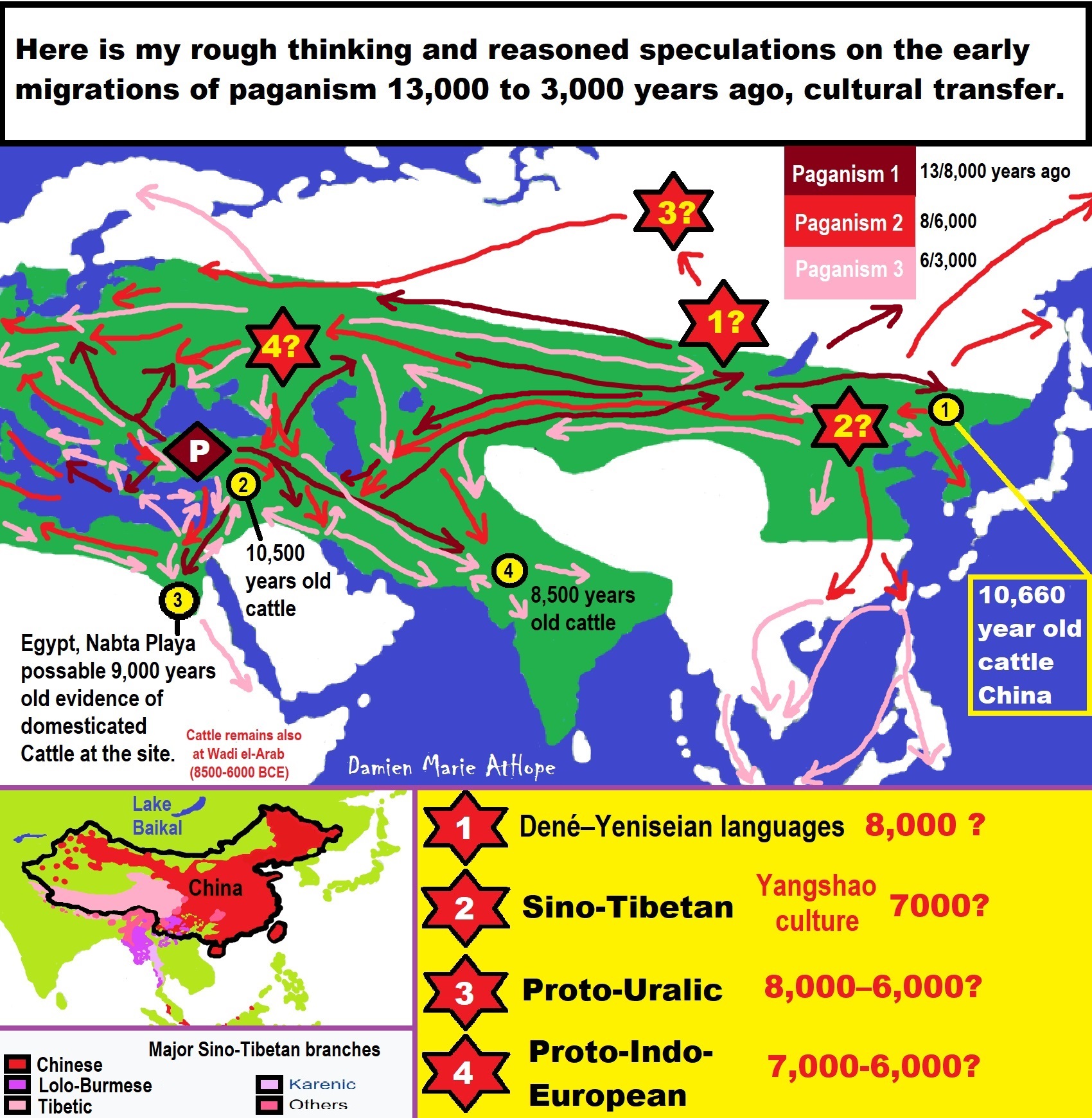

ref, ref, ref, ref, ref, ref, ref, ref, ref, ref, ref, ref, ref, ref, ref, ref, ref, ref, ref, ref, ref
Low Gods “Earth” or Tutelary deity and High Gods “Sky” or Supreme deity
“An Earth goddess is a deification of the Earth. Earth goddesses are often associated with the “chthonic” deities of the underworld. Ki and Ninhursag are Mesopotamian earth goddesses. In Greek mythology, the Earth is personified as Gaia, corresponding to Roman Terra, Indic Prithvi/Bhūmi, etc. traced to an “Earth Mother” complementary to the “Sky Father” in Proto-Indo-European religion. Egyptian mythology exceptionally has a sky goddess and an Earth god.” ref
“A mother goddess is a goddess who represents or is a personification of nature, motherhood, fertility, creation, destruction or who embodies the bounty of the Earth. When equated with the Earth or the natural world, such goddesses are sometimes referred to as Mother Earth or as the Earth Mother. In some religious traditions or movements, Heavenly Mother (also referred to as Mother in Heaven or Sky Mother) is the wife or feminine counterpart of the Sky father or God the Father.” ref
“Any masculine sky god is often also king of the gods, taking the position of patriarch within a pantheon. Such king gods are collectively categorized as “sky father” deities, with a polarity between sky and earth often being expressed by pairing a “sky father” god with an “earth mother” goddess (pairings of a sky mother with an earth father are less frequent). A main sky goddess is often the queen of the gods and may be an air/sky goddess in her own right, though she usually has other functions as well with “sky” not being her main. In antiquity, several sky goddesses in ancient Egypt, Mesopotamia, and the Near East were called Queen of Heaven. Neopagans often apply it with impunity to sky goddesses from other regions who were never associated with the term historically. The sky often has important religious significance. Many religions, both polytheistic and monotheistic, have deities associated with the sky.” ref
“In comparative mythology, sky father is a term for a recurring concept in polytheistic religions of a sky god who is addressed as a “father”, often the father of a pantheon and is often either a reigning or former King of the Gods. The concept of “sky father” may also be taken to include Sun gods with similar characteristics, such as Ra. The concept is complementary to an “earth mother“. “Sky Father” is a direct translation of the Vedic Dyaus Pita, etymologically descended from the same Proto-Indo-European deity name as the Greek Zeûs Pater and Roman Jupiter and Germanic Týr, Tir or Tiwaz, all of which are reflexes of the same Proto-Indo-European deity’s name, *Dyēus Ph₂tḗr. While there are numerous parallels adduced from outside of Indo-European mythology, there are exceptions (e.g. In Egyptian mythology, Nut is the sky mother and Geb is the earth father).” ref
Tutelary deity
“A tutelary (also tutelar) is a deity or spirit who is a guardian, patron, or protector of a particular place, geographic feature, person, lineage, nation, culture, or occupation. The etymology of “tutelary” expresses the concept of safety and thus of guardianship. In late Greek and Roman religion, one type of tutelary deity, the genius, functions as the personal deity or daimon of an individual from birth to death. Another form of personal tutelary spirit is the familiar spirit of European folklore.” ref
“A tutelary (also tutelar) in Korean shamanism, jangseung and sotdae were placed at the edge of villages to frighten off demons. They were also worshiped as deities. Seonangshin is the patron deity of the village in Korean tradition and was believed to embody the Seonangdang. In Philippine animism, Diwata or Lambana are deities or spirits that inhabit sacred places like mountains and mounds and serve as guardians. Such as: Maria Makiling is the deity who guards Mt. Makiling and Maria Cacao and Maria Sinukuan. In Shinto, the spirits, or kami, which give life to human bodies come from nature and return to it after death. Ancestors are therefore themselves tutelaries to be worshiped. And similarly, Native American beliefs such as Tonás, tutelary animal spirit among the Zapotec and Totems, familial or clan spirits among the Ojibwe, can be animals.” ref
“A tutelary (also tutelar) in Austronesian beliefs such as: Atua (gods and spirits of the Polynesian peoples such as the Māori or the Hawaiians), Hanitu (Bunun of Taiwan‘s term for spirit), Hyang (Kawi, Sundanese, Javanese, and Balinese Supreme Being, in ancient Java and Bali mythology and this spiritual entity, can be either divine or ancestral), Kaitiaki (New Zealand Māori term used for the concept of guardianship, for the sky, the sea, and the land), Kawas (mythology) (divided into 6 groups: gods, ancestors, souls of the living, spirits of living things, spirits of lifeless objects, and ghosts), Tiki (Māori mythology, Tiki is the first man created by either Tūmatauenga or Tāne and represents deified ancestors found in most Polynesian cultures). ” ref, ref, ref, ref, ref, ref, ref
Mesopotamian Tutelary Deities can be seen as ones related to City-States
“Historical city-states included Sumerian cities such as Uruk and Ur; Ancient Egyptian city-states, such as Thebes and Memphis; the Phoenician cities (such as Tyre and Sidon); the five Philistine city-states; the Berber city-states of the Garamantes; the city-states of ancient Greece (the poleis such as Athens, Sparta, Thebes, and Corinth); the Roman Republic (which grew from a city-state into a vast empire); the Italian city-states from the Middle Ages to the early modern period, such as Florence, Siena, Ferrara, Milan (which as they grew in power began to dominate neighboring cities) and Genoa and Venice, which became powerful thalassocracies; the Mayan and other cultures of pre-Columbian Mesoamerica (including cities such as Chichen Itza, Tikal, Copán and Monte Albán); the central Asian cities along the Silk Road; the city-states of the Swahili coast; Ragusa; states of the medieval Russian lands such as Novgorod and Pskov; and many others.” ref
“The Uruk period (ca. 4000 to 3100 BCE; also known as Protoliterate period) of Mesopotamia, named after the Sumerian city of Uruk, this period saw the emergence of urban life in Mesopotamia and the Sumerian civilization. City-States like Uruk and others had a patron tutelary City Deity along with a Priest-King.” ref
“Chinese folk religion, both past, and present, includes myriad tutelary deities. Exceptional individuals, highly cultivated sages, and prominent ancestors can be deified and honored after death. Lord Guan is the patron of military personnel and police, while Mazu is the patron of fishermen and sailors. Such as Tu Di Gong (Earth Deity) is the tutelary deity of a locality, and each individual locality has its own Earth Deity and Cheng Huang Gong (City God) is the guardian deity of an individual city, worshipped by local officials and locals since imperial times.” ref
“A tutelary (also tutelar) in Hinduism, personal tutelary deities are known as ishta-devata, while family tutelary deities are known as Kuladevata. Gramadevata are guardian deities of villages. Devas can also be seen as tutelary. Shiva is the patron of yogis and renunciants. City goddesses include: Mumbadevi (Mumbai), Sachchika (Osian); Kuladevis include: Ambika (Porwad), and Mahalakshmi. In NorthEast India Meitei mythology and religion (Sanamahism) of Manipur, there are various types of tutelary deities, among which Lam Lais are the most predominant ones. Tibetan Buddhism has Yidam as a tutelary deity. Dakini is the patron of those who seek knowledge.” ref
“A tutelary (also tutelar) The Greeks also thought deities guarded specific places: for instance, Athena was the patron goddess of the city of Athens. Socrates spoke of hearing the voice of his personal spirit or daimonion:
You have often heard me speak of an oracle or sign which comes to me … . This sign I have had ever since I was a child. The sign is a voice which comes to me and always forbids me to do something which I am going to do, but never commands me to do anything, and this is what stands in the way of my being a politician.” ref
“Tutelary deities who guard and preserve a place or a person are fundamental to ancient Roman religion. The tutelary deity of a man was his Genius, that of a woman her Juno. In the Imperial era, the Genius of the Emperor was a focus of Imperial cult. An emperor might also adopt a major deity as his personal patron or tutelary, as Augustus did Apollo. Precedents for claiming the personal protection of a deity were established in the Republican era, when for instance the Roman dictator Sulla advertised the goddess Victory as his tutelary by holding public games (ludi) in her honor.” ref
“Each town or city had one or more tutelary deities, whose protection was considered particularly vital in time of war and siege. Rome itself was protected by a goddess whose name was to be kept ritually secret on pain of death (for a supposed case, see Quintus Valerius Soranus). The Capitoline Triad of Juno, Jupiter, and Minerva were also tutelaries of Rome. The Italic towns had their own tutelary deities. Juno often had this function, as at the Latin town of Lanuvium and the Etruscan city of Veii, and was often housed in an especially grand temple on the arx (citadel) or other prominent or central location. The tutelary deity of Praeneste was Fortuna, whose oracle was renowned.” ref
“The Roman ritual of evocatio was premised on the belief that a town could be made vulnerable to military defeat if the power of its tutelary deity were diverted outside the city, perhaps by the offer of superior cult at Rome. The depiction of some goddesses such as the Magna Mater (Great Mother, or Cybele) as “tower-crowned” represents their capacity to preserve the city. A town in the provinces might adopt a deity from within the Roman religious sphere to serve as its guardian, or syncretize its own tutelary with such; for instance, a community within the civitas of the Remi in Gaul adopted Apollo as its tutelary, and at the capital of the Remi (present-day Rheims), the tutelary was Mars Camulus.” ref
Household deity (a kind of or related to a Tutelary deity)
“A household deity is a deity or spirit that protects the home, looking after the entire household or certain key members. It has been a common belief in paganism as well as in folklore across many parts of the world. Household deities fit into two types; firstly, a specific deity – typically a goddess – often referred to as a hearth goddess or domestic goddess who is associated with the home and hearth, such as the ancient Greek Hestia.” ref
“The second type of household deities are those that are not one singular deity, but a type, or species of animistic deity, who usually have lesser powers than major deities. This type was common in the religions of antiquity, such as the Lares of ancient Roman religion, the Gashin of Korean shamanism, and Cofgodas of Anglo-Saxon paganism. These survived Christianisation as fairy-like creatures existing in folklore, such as the Anglo-Scottish Brownie and Slavic Domovoy.” ref
“Household deities were usually worshipped not in temples but in the home, where they would be represented by small idols (such as the teraphim of the Bible, often translated as “household gods” in Genesis 31:19 for example), amulets, paintings, or reliefs. They could also be found on domestic objects, such as cosmetic articles in the case of Tawaret. The more prosperous houses might have a small shrine to the household god(s); the lararium served this purpose in the case of the Romans. The gods would be treated as members of the family and invited to join in meals, or be given offerings of food and drink.” ref
“In many religions, both ancient and modern, a god would preside over the home. Certain species, or types, of household deities, existed. An example of this was the Roman Lares. Many European cultures retained house spirits into the modern period. Some examples of these include:
- Brownie (Scotland and England) or Hob (England) / Kobold (Germany) / Goblin / Hobgoblin
- Domovoy (Slavic)
- Nisse (Norwegian or Danish) / Tomte (Swedish) / Tonttu (Finnish)
- Húsvættir (Norse)” ref
“Although the cosmic status of household deities was not as lofty as that of the Twelve Olympians or the Aesir, they were also jealous of their dignity and also had to be appeased with shrines and offerings, however humble. Because of their immediacy they had arguably more influence on the day-to-day affairs of men than the remote gods did. Vestiges of their worship persisted long after Christianity and other major religions extirpated nearly every trace of the major pagan pantheons. Elements of the practice can be seen even today, with Christian accretions, where statues to various saints (such as St. Francis) protect gardens and grottos. Even the gargoyles found on older churches, could be viewed as guardians partitioning a sacred space.” ref
“For centuries, Christianity fought a mop-up war against these lingering minor pagan deities, but they proved tenacious. For example, Martin Luther‘s Tischreden have numerous – quite serious – references to dealing with kobolds. Eventually, rationalism and the Industrial Revolution threatened to erase most of these minor deities, until the advent of romantic nationalism rehabilitated them and embellished them into objects of literary curiosity in the 19th century. Since the 20th century this literature has been mined for characters for role-playing games, video games, and other fantasy personae, not infrequently invested with invented traits and hierarchies somewhat different from their mythological and folkloric roots.” ref
“In contradistinction to both Herbert Spencer and Edward Burnett Tylor, who defended theories of animistic origins of ancestor worship, Émile Durkheim saw its origin in totemism. In reality, this distinction is somewhat academic, since totemism may be regarded as a particularized manifestation of animism, and something of a synthesis of the two positions was attempted by Sigmund Freud. In Freud’s Totem and Taboo, both totem and taboo are outward expressions or manifestations of the same psychological tendency, a concept which is complementary to, or which rather reconciles, the apparent conflict. Freud preferred to emphasize the psychoanalytic implications of the reification of metaphysical forces, but with particular emphasis on its familial nature. This emphasis underscores, rather than weakens, the ancestral component.” ref
“William Edward Hearn, a noted classicist, and jurist, traced the origin of domestic deities from the earliest stages as an expression of animism, a belief system thought to have existed also in the neolithic, and the forerunner of Indo-European religion. In his analysis of the Indo-European household, in Chapter II “The House Spirit”, Section 1, he states:
The belief which guided the conduct of our forefathers was … the spirit rule of dead ancestors.” ref
“In Section 2 he proceeds to elaborate:
It is thus certain that the worship of deceased ancestors is a vera causa, and not a mere hypothesis. …
In the other European nations, the Slavs, the Teutons, and the Kelts, the House Spirit appears with no less distinctness. … [T]he existence of that worship does not admit of doubt. … The House Spirits had a multitude of other names which it is needless here to enumerate, but all of which are more or less expressive of their friendly relations with man. … In [England] … [h]e is the Brownie. … In Scotland this same Brownie is well known. He is usually described as attached to particular families, with whom he has been known to reside for centuries, threshing the corn, cleaning the house, and performing similar household tasks. His favorite gratification was milk and honey.” ref

ref, ref, ref, ref, ref, ref, ref, ref, ref, ref, ref, ref, ref, ref, ref, ref, ref
“These ideas are my speculations from the evidence.”
I am still researching the “god‘s origins” all over the world. So you know, it is very complicated but I am smart and willing to look, DEEP, if necessary, which going very deep does seem to be needed here, when trying to actually understand the evolution of gods and goddesses. I am sure of a few things and less sure of others, but even in stuff I am not fully grasping I still am slowly figuring it out, to explain it to others. But as I research more I am understanding things a little better, though I am still working on understanding it all or something close and thus always figuring out more.
Sky Father/Sky God?
“Egyptian: (Nut) Sky Mother and (Geb) Earth Father” (Egypt is different but similar)
Turkic/Mongolic: (Tengri/Tenger Etseg) Sky Father and (Eje/Gazar Eej) Earth Mother *Transeurasian*
Hawaiian: (Wākea) Sky Father and (Papahānaumoku) Earth Mother *Austronesian*
New Zealand/ Māori: (Ranginui) Sky Father and (Papatūānuku) Earth Mother *Austronesian*
Proto-Indo-European: (Dyḗus/Dyḗus ph₂tḗr) Sky Father and (Dʰéǵʰōm/Pleth₂wih₁) Earth Mother
Indo-Aryan: (Dyaus Pita) Sky Father and (Prithvi Mata) Earth Mother *Indo-European*
Italic: (Jupiter) Sky Father and (Juno) Sky Mother *Indo-European*
Etruscan: (Tinia) Sky Father and (Uni) Sky Mother *Tyrsenian/Italy Pre–Indo-European*
Hellenic/Greek: (Zeus) Sky Father and (Hera) Sky Mother who started as an “Earth Goddess” *Indo-European*
Nordic: (Dagr) Sky Father and (Nótt) Sky Mother *Indo-European*
Slavic: (Perun) Sky Father and (Mokosh) Earth Mother *Indo-European*
Illyrian: (Deipaturos) Sky Father and (Messapic Damatura’s “earth-mother” maybe) Earth Mother *Indo-European*
Albanian: (Zojz) Sky Father and (?) *Indo-European*
Baltic: (Perkūnas) Sky Father and (Saulė) Sky Mother *Indo-European*
Germanic: (Týr) Sky Father and (?) *Indo-European*
Colombian-Muisca: (Bochica) Sky Father and (Huythaca) Sky Mother *Chibchan*
Aztec: (Quetzalcoatl) Sky Father and (Xochiquetzal) Sky Mother *Uto-Aztecan*
Incan: (Viracocha) Sky Father and (Mama Runtucaya) Sky Mother *Quechuan*
China: (Tian/Shangdi) Sky Father and (Dì) Earth Mother *Sino-Tibetan*
Sumerian, Assyrian and Babylonian: (An/Anu) Sky Father and (Ki) Earth Mother
Finnish: (Ukko) Sky Father and (Akka) Earth Mother *Finno-Ugric*
Sami: (Horagalles) Sky Father and (Ravdna) Earth Mother *Finno-Ugric*
Puebloan-Zuni: (Ápoyan Ta’chu) Sky Father and (Áwitelin Tsíta) Earth Mother
Puebloan-Hopi: (Tawa) Sky Father and (Kokyangwuti/Spider Woman/Grandmother) Earth Mother *Uto-Aztecan*
Puebloan-Navajo: (Tsohanoai) Sky Father and (Estsanatlehi) Earth Mother *Na-Dene*
ref, ref, ref, ref, ref, ref, ref, ref, ref, ref, ref, ref, ref, ref, ref, ref, ref, ref, ref, ref, ref, ref, ref, ref, ref, ref, ref

Hinduism around 3,700 to 3,500 years old. ref
Judaism around 3,450 or 3,250 years old. (The first writing in the bible was “Paleo-Hebrew” dated to around 3,000 years ago Khirbet Qeiyafa is the site of an ancient fortress city overlooking the Elah Valley. And many believe the religious Jewish texts were completed around 2,500) ref, ref
Judaism is around 3,450 or 3,250 years old. (“Paleo-Hebrew” 3,000 years ago and Torah 2,500 years ago)
“Judaism is an Abrahamic, its roots as an organized religion in the Middle East during the Bronze Age. Some scholars argue that modern Judaism evolved from Yahwism, the religion of ancient Israel and Judah, by the late 6th century BCE, and is thus considered to be one of the oldest monotheistic religions.” ref
“Yahwism is the name given by modern scholars to the religion of ancient Israel, essentially polytheistic, with a plethora of gods and goddesses. Heading the pantheon was Yahweh, the national god of the Israelite kingdoms of Israel and Judah, with his consort, the goddess Asherah; below them were second-tier gods and goddesses such as Baal, Shamash, Yarikh, Mot, and Astarte, all of whom had their own priests and prophets and numbered royalty among their devotees, and a third and fourth tier of minor divine beings, including the mal’ak, the messengers of the higher gods, who in later times became the angels of Judaism, Christianity and Islam. Yahweh, however, was not the ‘original’ god of Israel “Isra-El”; it is El, the head of the Canaanite pantheon, whose name forms the basis of the name “Israel”, and none of the Old Testament patriarchs, the tribes of Israel, the Judges, or the earliest monarchs, have a Yahwistic theophoric name (i.e., one incorporating the name of Yahweh).” ref
“El is a Northwest Semitic word meaning “god” or “deity“, or referring (as a proper name) to any one of multiple major ancient Near Eastern deities. A rarer form, ‘ila, represents the predicate form in Old Akkadian and in Amorite. The word is derived from the Proto-Semitic *ʔil-, meaning “god”. Specific deities known as ‘El or ‘Il include the supreme god of the ancient Canaanite religion and the supreme god of East Semitic speakers in Mesopotamia’s Early Dynastic Period. ʼĒl is listed at the head of many pantheons. In some Canaanite and Ugaritic sources, ʼĒl played a role as father of the gods, of creation, or both. For example, in the Ugaritic texts, ʾil mlk is understood to mean “ʼĒl the King” but ʾil hd as “the god Hadad“. The Semitic root ʾlh (Arabic ʾilāh, Aramaic ʾAlāh, ʾElāh, Hebrew ʾelōah) may be ʾl with a parasitic h, and ʾl may be an abbreviated form of ʾlh. In Ugaritic the plural form meaning “gods” is ʾilhm, equivalent to Hebrew ʾelōhîm “powers”. In the Hebrew texts this word is interpreted as being semantically singular for “god” by biblical commentators. However the documentary hypothesis for the Old Testament (corresponds to the Jewish Torah) developed originally in the 1870s, identifies these that different authors – the Jahwist, Elohist, Deuteronomist, and the Priestly source – were responsible for editing stories from a polytheistic religion into those of a monotheistic religion. Inconsistencies that arise between monotheism and polytheism in the texts are reflective of this hypothesis.” ref
Jainism around 2,599 – 2,527 years old. ref
Confucianism around 2,600 – 2,551 years old. ref
Buddhism around 2,563/2,480 – 2,483/2,400 years old. ref
Christianity around 2,o00 years old. ref
Shinto around 1,305 years old. ref
Islam around 1407–1385 years old. ref

Knowledge to Ponder:
Stars/Astrology:
- Possibly, around 30,000 years ago (in simpler form) to 6,000 years ago, Stars/Astrology are connected to Ancestors, Spirit Animals, and Deities.
- The star also seems to be a possible proto-star for Star of Ishtar, Star of Inanna, or Star of Venus.
- Around 7,000 to 6,000 years ago, Star Constellations/Astrology have connections to the “Kurgan phenomenon” of below-ground “mound” stone/wood burial structures and “Dolmen phenomenon” of above-ground stone burial structures.
- Around 6,500–5,800 years ago, The Northern Levant migrations into Jordon and Israel in the Southern Levant brought new cultural and religious transfer from Turkey and Iran.
- “The Ghassulian Star,” a mysterious 6,000-year-old mural from Jordan may have connections to the European paganstic kurgan/dolmens phenomenon.
“Astrology is a range of divinatory practices, recognized as pseudoscientific since the 18th century, that claim to discern information about human affairs and terrestrial events by studying the apparent positions of celestial objects. Different cultures have employed forms of astrology since at least the 2nd millennium BCE, these practices having originated in calendrical systems used to predict seasonal shifts and to interpret celestial cycles as signs of divine communications. Most, if not all, cultures have attached importance to what they observed in the sky, and some—such as the Hindus, Chinese, and the Maya—developed elaborate systems for predicting terrestrial events from celestial observations. Western astrology, one of the oldest astrological systems still in use, can trace its roots to 19th–17th century BCE Mesopotamia, from where it spread to Ancient Greece, Rome, the Islamicate world and eventually Central and Western Europe. Contemporary Western astrology is often associated with systems of horoscopes that purport to explain aspects of a person’s personality and predict significant events in their lives based on the positions of celestial objects; the majority of professional astrologers rely on such systems.” ref
Around 5,500 years ago, Science evolves, The first evidence of science was 5,500 years ago and was demonstrated by a body of empirical, theoretical, and practical knowledge about the natural world. ref
Around 5,000 years ago, Origin of Logics is a Naturalistic Observation (principles of valid reasoning, inference, & demonstration) ref
Around 4,150 to 4,000 years ago: The earliest surviving versions of the Sumerian Epic of Gilgamesh, which was originally titled “He who Saw the Deep” (Sha naqba īmuru) or “Surpassing All Other Kings” (Shūtur eli sharrī) were written. ref
Hinduism:
- 3,700 years ago or so, the oldest of the Hindu Vedas (scriptures), the Rig Veda was composed.
- 3,500 years ago or so, the Vedic Age began in India after the collapse of the Indus Valley Civilization.
Judaism:
- around 3,000 years ago, the first writing in the bible was “Paleo-Hebrew”
- around 2,500 years ago, many believe the religious Jewish texts were completed
Myths: The bible inspired religion is not just one religion or one myth but a grouping of several religions and myths
- Around 3,450 or 3,250 years ago, according to legend, is the traditionally accepted period in which the Israelite lawgiver, Moses, provided the Ten Commandments.
- Around 2,500 to 2,400 years ago, a collection of ancient religious writings by the Israelites based primarily upon the Hebrew Bible, Tanakh, or Old Testament is the first part of Christianity’s bible.
- Around 2,400 years ago, the most accepted hypothesis is that the canon was formed in stages, first the Pentateuch (Torah).
- Around 2,140 to 2,116 years ago, the Prophets was written during the Hasmonean dynasty, and finally the remaining books.
- Christians traditionally divide the Old Testament into four sections:
- The first five books or Pentateuch (Torah).
- The proposed history books telling the history of the Israelites from their conquest of Canaan to their defeat and exile in Babylon.
- The poetic and proposed “Wisdom books” dealing, in various forms, with questions of good and evil in the world.
- The books of the biblical prophets, warning of the consequences of turning away from God:
- Henotheism:
- Exodus 20:23 “You shall not make other gods besides Me (not saying there are no other gods just not to worship them); gods of silver or gods of gold, you shall not make for yourselves.”
- Polytheism:
- Judges 10:6 “Then the sons of Israel again did evil in the sight of the LORD, served the Baals and the Ashtaroth, the gods of Aram, the gods of Sidon, the gods of Moab, the gods of the sons of Ammon, and the gods of the Philistines; thus they forsook the LORD and did not serve Him.”
- 1 Corinthians 8:5 “For even if there are so-called gods whether in heaven or on earth, as indeed there are many gods and many lords.”
- Monotheism:
- Isaiah 43:10 “You are my witnesses,” declares the LORD, “and my servant whom I have chosen, so that you may know and believe me and understand that I am he. Before me no god was formed, nor will there be one after me.
Around 2,570 to 2,270 Years Ago, there is a confirmation of atheistic doubting as well as atheistic thinking, mainly by Greek philosophers. However, doubting gods is likely as old as the invention of gods and should destroy the thinking that belief in god(s) is the “default belief”. The Greek word is apistos (a “not” and pistos “faithful,”), thus not faithful or faithless because one is unpersuaded and unconvinced by a god(s) claim. Short Definition: unbelieving, unbeliever, or unbelief.

Expressions of Atheistic Thinking:
- Around 2,600 years ago, Ajita Kesakambali, ancient Indian philosopher, who is the first known proponent of Indian materialism. ref
- Around 2,535 to 2,475 years ago, Heraclitus, Greek pre-Socratic philosopher, a native of the Greek city Ephesus, Ionia, on the coast of Anatolia, also known as Asia Minor or modern Turkey. ref
- Around 2,500 to 2,400 years ago, according to The Story of Civilization book series certain African pygmy tribes have no identifiable gods, spirits, or religious beliefs or rituals, and even what burials accrue are without ceremony. ref
- Around 2,490 to 2,430 years ago, Empedocles, Greek pre-Socratic philosopher and a citizen of Agrigentum, a Greek city in Sicily. ref
- Around 2,460 to 2,370 years ago, Democritus, Greek pre-Socratic philosopher considered to be the “father of modern science” possibly had some disbelief amounting to atheism. ref
- Around 2,399 years ago or so, Socrates, a famous Greek philosopher was tried for sinfulness by teaching doubt of state gods. ref
- Around 2,341 to 2,270 years ago, Epicurus, a Greek philosopher known for composing atheistic critics and famously stated, “Is God willing to prevent evil, but not able? Then he is not omnipotent. Is he able, but not willing? Then he is malevolent. Is he both able and willing? Then whence cometh evil? Is he neither able nor willing? Then why call him god?” ref
This last expression by Epicurus, seems to be an expression of Axiological Atheism. To understand and utilize value or actually possess “Value Conscious/Consciousness” to both give a strong moral “axiological” argument (the problem of evil) as well as use it to fortify humanism and positive ethical persuasion of human helping and care responsibilities. Because value-blindness gives rise to sociopathic/psychopathic evil.



While hallucinogens are associated with shamanism, it is alcohol that is associated with paganism.
The Atheist-Humanist-Leftist Revolutionaries Shows in the prehistory series:
Show two: Pre-animism 300,000 years old and animism 100,000 years old: related to “Anarchism and Socialism”
Show tree: Totemism 50,000 years old: related to “Anarchism and Socialism”
Show four: Shamanism 30,000 years old: related to “Anarchism and Socialism”
Show five: Paganism 12,000 years old: related to “Anarchism and Socialism”
Show six: Emergence of hierarchy, sexism, slavery, and the new male god dominance: Paganism 7,000-5,000 years old: related to “Anarchism and Socialism” (Capitalism) (World War 0) Elite and their slaves!
Prehistory: related to “Anarchism and Socialism” the division of labor, power, rights, and recourses: VIDEO
Pre-animism 300,000 years old and animism 100,000 years old: related to “Anarchism and Socialism”: VIDEO
Totemism 50,000 years old: related to “Anarchism and Socialism”: VIDEO
Shamanism 30,000 years old: related to “Anarchism and Socialism”: VIDEO
Paganism 12,000 years old: related to “Anarchism and Socialism” (Pre-Capitalism): VIDEO
Paganism 7,000-5,000 years old: related to “Anarchism and Socialism” (Capitalism) (World War 0) Elite and their slaves: VIEDO
Paganism 5,000 years old: progressed organized religion and the state: related to “Anarchism and Socialism” (Kings and the Rise of the State): VIEDO
Paganism 4,000 years old: related to “Anarchism and Socialism” (First Moralistic gods, then the Origin time of Monotheism): VIEDO
I do not hate simply because I challenge and expose myths or lies any more than others being thought of as loving simply because of the protection and hiding from challenge their favored myths or lies.
The truth is best championed in the sunlight of challenge.
An archaeologist once said to me “Damien religion and culture are very different”
My response, So are you saying that was always that way, such as would you say Native Americans’ cultures are separate from their religions? And do you think it always was the way you believe?
I had said that religion was a cultural product. That is still how I see it and there are other archaeologists that think close to me as well. Gods too are the myths of cultures that did not understand science or the world around them, seeing magic/supernatural everywhere.
I personally think there is a goddess and not enough evidence to support a male god at Çatalhöyük but if there was both a male and female god and goddess then I know the kind of gods they were like Proto-Indo-European mythology.
This series idea was addressed in, Anarchist Teaching as Free Public Education or Free Education in the Public: VIDEO
Our 12 video series: Organized Oppression: Mesopotamian State Force and the Politics of power (9,000-4,000 years ago), is adapted from: The Complete and Concise History of the Sumerians and Early Bronze Age Mesopotamia (7000-2000 BC): https://www.youtube.com/watch?v=szFjxmY7jQA by “History with Cy“
Show #1: Mesopotamian State Force and the Politics of Power (Samarra, Halaf, Ubaid)
Show #2: Mesopotamian State Force and the Politics of Power
Show #3: Mesopotamian State Force and the Politics of Power (Uruk and the First Cities)
Show #4: Mesopotamian State Force and the Politics of Power (First Kings)
Show #5: Mesopotamian State Force and the Politics of Power (Early Dynastic Period)
Show #6: Mesopotamian State Force and the Politics of Power
Show #7: Mesopotamian State Force and the Politics of Power (Sargon and Akkadian Rule)
Show #9: Mesopotamian State Force and the Politics of Power (Gudea of Lagash and Utu-hegal)
Show #12: Mesopotamian State Force and the Politics of Power (Aftermath and Legacy of Sumer)

The “Atheist-Humanist-Leftist Revolutionaries”
Cory Johnston ☭ Ⓐ Atheist Leftist @Skepticallefty & I (Damien Marie AtHope) @AthopeMarie (my YouTube & related blog) are working jointly in atheist, antitheist, antireligionist, antifascist, anarchist, socialist, and humanist endeavors in our videos together, generally, every other Saturday.
Why Does Power Bring Responsibility?
Think, how often is it the powerless that start wars, oppress others, or commit genocide? So, I guess the question is to us all, to ask, how can power not carry responsibility in a humanity concept? I know I see the deep ethical responsibility that if there is power their must be a humanistic responsibility of ethical and empathic stewardship of that power. Will I be brave enough to be kind? Will I possess enough courage to be compassionate? Will my valor reach its height of empathy? I as everyone, earns our justified respect by our actions, that are good, ethical, just, protecting, and kind. Do I have enough self-respect to put my love for humanity’s flushing, over being brought down by some of its bad actors? May we all be the ones doing good actions in the world, to help human flourishing.
I create the world I want to live in, striving for flourishing. Which is not a place but a positive potential involvement and promotion; a life of humanist goal precision. To master oneself, also means mastering positive prosocial behaviors needed for human flourishing. I may have lost a god myth as an atheist, but I am happy to tell you, my friend, it is exactly because of that, leaving the mental terrorizer, god belief, that I truly regained my connected ethical as well as kind humanity.
Cory and I will talk about prehistory and theism, addressing the relevance to atheism, anarchism, and socialism.
At the same time as the rise of the male god, 7,000 years ago, there was also the very time there was the rise of violence, war, and clans to kingdoms, then empires, then states. It is all connected back to 7,000 years ago, and it moved across the world.
Cory Johnston: https://damienmarieathope.com/2021/04/cory-johnston-mind-of-a-skeptical-leftist/?v=32aec8db952d
The Mind of a Skeptical Leftist (YouTube)
Cory Johnston: Mind of a Skeptical Leftist @Skepticallefty
The Mind of a Skeptical Leftist By Cory Johnston: “Promoting critical thinking, social justice, and left-wing politics by covering current events and talking to a variety of people. Cory Johnston has been thoughtfully talking to people and attempting to promote critical thinking, social justice, and left-wing politics.” http://anchor.fm/skepticalleft
Cory needs our support. We rise by helping each other.
Cory Johnston ☭ Ⓐ @Skepticallefty Evidence-based atheist leftist (he/him) Producer, host, and co-host of 4 podcasts @skeptarchy @skpoliticspod and @AthopeMarie
Damien Marie AtHope (“At Hope”) Axiological Atheist, Anti-theist, Anti-religionist, Secular Humanist. Rationalist, Writer, Artist, Poet, Philosopher, Advocate, Activist, Psychology, and Armchair Archaeology/Anthropology/Historian.
Damien is interested in: Freedom, Liberty, Justice, Equality, Ethics, Humanism, Science, Atheism, Antiteism, Antireligionism, Ignosticism, Left-Libertarianism, Anarchism, Socialism, Mutualism, Axiology, Metaphysics, LGBTQI, Philosophy, Advocacy, Activism, Mental Health, Psychology, Archaeology, Social Work, Sexual Rights, Marriage Rights, Woman’s Rights, Gender Rights, Child Rights, Secular Rights, Race Equality, Ageism/Disability Equality, Etc. And a far-leftist, “Anarcho-Humanist.”
I am not a good fit in the atheist movement that is mostly pro-capitalist, I am anti-capitalist. Mostly pro-skeptic, I am a rationalist not valuing skepticism. Mostly pro-agnostic, I am anti-agnostic. Mostly limited to anti-Abrahamic religions, I am an anti-religionist.
To me, the “male god” seems to have either emerged or become prominent around 7,000 years ago, whereas the now favored monotheism “male god” is more like 4,000 years ago or so. To me, the “female goddess” seems to have either emerged or become prominent around 11,000-10,000 years ago or so, losing the majority of its once prominence around 2,000 years ago due largely to the now favored monotheism “male god” that grow in prominence after 4,000 years ago or so.
My Thought on the Evolution of Gods?
Animal protector deities from old totems/spirit animal beliefs come first to me, 13,000/12,000 years ago, then women as deities 11,000/10,000 years ago, then male gods around 7,000/8,000 years ago. Moralistic gods around 5,000/4,000 years ago, and monotheistic gods around 4,000/3,000 years ago.


Damien Marie AtHope (Said as “At” “Hope”)/(Autodidact Polymath but not good at math):
Axiological Atheist, Anti-theist, Anti-religionist, Secular Humanist, Rationalist, Writer, Artist, Jeweler, Poet, “autodidact” Philosopher, schooled in Psychology, and “autodidact” Armchair Archaeology/Anthropology/Pre-Historian (Knowledgeable in the range of: 1 million to 5,000/4,000 years ago). I am an anarchist socialist politically. Reasons for or Types of Atheism
My Website, My Blog, & Short-writing or Quotes, My YouTube, Twitter: @AthopeMarie, and My Email: damien.marie.athope@gmail.com

